Whole Notes



2 School News
New Faculty Welcomed
2020: The Year in Photos
and Recordings
Faculty News
New Faculty
Music Behind the Masks
Introductions: Carrie Shaw, Voice
E xit Interview: Richard Karpen
Student & Alumni News
. . . . Giving Highlights
2019-20 Scholarship Recipients
2020-21 Scholarship Recipients
Friends of the School of Music
The years 2020 and 2021 have been refracted through a lurching lens that took us all by surprise in March 2020. We have been altered individually and collectively, sometimes deliberately focusing on how we want to change, and sometimes merely adapting as rapidly as we were able. At the same time, we commiserated with colleagues, alumni, and students who endured grievous losses of family members and friends.
While the work of our faculty and students intensified when it went online, we found a productive stillness in our restricted ability to travel. We deliberately explored ways of promoting activism within the School of Music, of revising our courses to broaden their inclusivity, and expanding our performance and course repertoire to add formerly silenced voices of composers of color, as well as women. Faculty musicians such as David Rahbee, Rachel Lee Priday, and Cristina Valdés brought Black and Latinx composers of remarkable music from the margins to the center of the stage in performances that we have preserved online. Faculty members completely revised music-major offerings in music history to change current courses and add others that expand the types of music and composers we will teach. The faculty overall considered the contributions of composers who had been silenced, creating a platform on which we plan to build future courses and concerts as we move forward.
As we come to the end of a second academic year that was largely comprised of remote classes, online performances, and distanced rehearsals, we can glimpse the horizon of the return of on-campus activity in Autumn 2021. As we return to classrooms and performance halls, we will carry forward what we have learned and transformed in the past eighteen months.
Volume 9, Number 1 Fall 2020. Fall 2021
Editor Joanne De Pue Design Chelsea Broeder, Cory Hiraiwa Photography Steve Korn, Joanne De Pue, Gary Louie, Cory Hiraiwa, Timothy Little, and others as credited.
Whole Notes is an annual publication of the University of Washington School of Music.
We’d love to hear from you
We welcome updates from School of Music alumni and faculty. Please drop us a line and share your latest news and accomplishments. We will include your update, as space allows, in an upcoming issue of Whole Notes.
Send updates to: Publicity Office School of Music, Box 353450, University of Washington Seattle, WA 98195-3450, or email musinfo@uw.edu
This issue of Whole Notes documents in some small ways the achievements and milestones of this challenging period. But it has been a period of profound change that is impossible to represent completely.
Our ability to keep moving forward during this time has depended on every student who continued to work creatively, under challenging circumstances, to complete courses, recitals, research, and theses; on our many staff members who kept every aspect of our School operational, visible, and accessible; and on the faculty who adapted their teaching every day to adjust to these new realities. We needed every ounce of effort, and we are grateful for all the work that has allowed us to continue as a School of Music, work that is supported in many cases by the generous friends acknowledged in this report. Thank you!
JoAnn Taricani, Director, School of Music
Front Cover: Percussion student Sophie Chin in performance, Autumn Quarter 2020.
Back Cover: A snowy glimpse of the Music Building from the Arts and Sciences Quadrangle.
Photo: Cory Hiraiwa

Professor JoAnn Taricani has been named the next director of the University of Washington School of Music. A longtime faculty member in the Music History program at the university, she succeeds Richard Karpen as director in a five-year appointment that took effect July 1, 2020.
UW College of Arts and Sciences Dean Robert Stacey and Divisional Dean of the Arts Catherine Cole announced the selection following an internal search process that sought input from the School of Music community.

“In our discussions with JoAnn we reviewed the important issues facing the school both now and in the future,” the deans wrote to faculty and staff in a letter announcing her appointment. “We are confident JoAnn will provide excellent leadership and invite you to join us in supporting her efforts.”
University of Washington President Ana Mari Cauce echoed the deans’ confidence in the selection. “JoAnn combines a wealth of leadership experience with deep knowledge and understanding of the School of Music,” she said, “making her the ideal candidate to lead the school’s faculty, staff and students in the vital work of advancing excellence in music scholarship and performance.”
Along with her research and performance activities for many years on the School of Music faculty, Professor Taricani’s service to the UW has included her ongoing work in a variety of university-level issues, including budget committees, facilities planning, and membership on the board of directors at UW Medicine. She has lobbied for all University of Washington faculty at the state Legislature, elected by the Faculty Senate as the faculty legislative

Two recent gifts in support of organ performance will honor more than a century of organ instruction and performance at the University of Washington School of Music, moving this highly regarded program to a new level of national prominence.
The organ builder and artist Paul B. Fritts (pictured at left) has generously endowed the first Faculty Fellowship in the School of Music, with a remarkable $1.5 million gift that will provide support for the organ performance degree programs. The Paul B. Fritts Endowed Faculty Fellowship will fund instruction from outstanding organists who are noted for their exceptional scholarly and professional contributions to the field. This gift establishes one of the largest endowments in the School of Music. Leading his team at Paul Fritts & Co. Organ Builders, Mr. Fritts, a native of Tacoma, has designed, built, and reconstructed over fifty renowned organs over the past forty years, with his creations located in churches, universities, and residences across the country and abroad. His high level of craftsmanship and the beauty of his instruments represent a careerlong dedication to reclaiming the best practices of organ building in the 17th and 18th centuries in Northern Europe, a high point in the history of organ composition and performance. The University of Washington is fortunate to house a remarkable example of his work: the Littlefield Organ in the Walker-Ames Room in Kane Hall (pictured below), which debuted in 1990 and has been the location of numerous organ concerts over the past thirty years.
Director of the School of Music, Professor JoAnn Taricani, declared that she is “delighted to welcome this endowed faculty fellowship and its organists to the university as a companion to the beautiful Littlefield Organ that was built by Mr. Fritts. The organ program has always brought distinguished students to our campus, and this gift will allow our great legacy to continue into future generations.”
Professor Emerita of Organ, Carole Terry, who taught organ at the university for forty years, echoed that “I am elated by this news and by the wonderful gift from Mr. Fritts.”
At the same time, the School of Music has received a generous gift of $250,000 from an anonymous donor to create a four-year organ competition for early-career organists. Showcasing exceptional young talent, the competition will enable a larger audience to discover and admire the beauty of celebrated organ music. The timing and details of this competition will be announced once it is possible again to schedule public events.
Professor Taricani remarked that “this is a perfect alignment of gifts to encourage young organists, with the competition beginning at the same time that the faculty endowment will commence.”
Professor Emerita Carole Terry further observed that “I am filled with gratitude for the generosity of those who love the organ and its music.”
School of Music student Renee Zhang was recently named a University of Washington President’s Medalist in recognition of her academic achievements at the UW.
Zhang, recognized for her achievements in the 2018-19 academic year, is earning degrees in violin performance and biology at the UW and on track to graduate in June 2021. A student of Ron Patterson, she serves as concert master of the University Symphony Orchestra, president of the UW Chamber Music Club, and gives back to the community by performing frequently for patients at area assisted living and memory care facilities.

Zhang’s President’s Medal celebrates her as the top student in the junior class at UW in the 2018-19 academic year. Honorees were selected by a committee for their high GPA, rigor of their classes and number of Honors courses they have completed. The award winners were honored in a special reception with UW President Ana Mari Cauce
“Renee is a gifted musician and a wonderful human being,” says her UW violin teacher, Professor Ronald Patterson. “Her academic achievements are well-deserved, and all of us at the School of Music are pleased and proud that the UW has granted her such a prestigious recogntion.”
Associate Professor Christina Sunardi has been appointed chair of the University of Washington Department of Dance. Her appointment began on July 1, 2020.

She succeeds Jennifer Salk, Associate Professor in the Dance Program, who served six and a half years as department chair.
Professor Sunardi has been teaching at the UW since 2008. Chair of the School of Music Ethnomusicology program, her research interests include performance, identity, spirituality and ethnography in Indonesia, with her work particularly focused on the articulation of gender through music, dance, and theater in the cultural region of east Java.
In her years at the School of Music, she has been instrumental in enhancing the School’s instruction in the area of Javanese gamelan performance, bringing visiting artists to the School to work with UW students, and overseeing the School’s acquisition of its own set of gamelan instruments.
Her publication highlights include articles in Bijdragen Tot de Taal-, Land en Volkenkunde, Asian Music, and Ethnomusicology, as well as reviews in the Journal of Folklore Research Reviews, American Journal of Islamic Social Sciences, and Indonesia. Dr. Sunardi has been studying and performing Javanese arts since 1997 in Indonesia and the United States, earning her Ph.D. in music from the University of California, Berkeley in 2007. Her book about the negotiation of gender and tradition through dance and music in east Java was published by the University of Illinois Press in 2015.
Though Professor Sunardi’s appointment at the Department of Dance is for a five-yea r term, she will continue to maintain a presence at the School of Music. “I will still be connected to the School of Music,” she said on Feb. 11. “I’ll still be faculty in Music and I’ll still teach gamelan and a new course on rap in the coming year.”
representative for numerous legislative sessions. She has also served as the special counsel to the President of the University of Michigan, working on national issues of higher education, including the 2003 U.S. Supreme Court case on affirmative action in admissions.
At the School of Music, Professor Taricani produces early music performances through the student Collegium Musicum and in recordings with professional musicians. Her edition of the theatre music of the novelist Henry Fielding was issued in several volumes by Oxford University Press between 2004-2013, part of UW English Professor Tom Lockwood’s comprehensive edition of his plays. In early music, her scholarship has been recognized internationally, including collaboration with the Folger Shakespeare Library on a Baroque opera premiere. She was presented with the 2017 Noah Greenberg Award, the top award offered by the American Musicological Society for distinction in historical performance, for her discoveries in Restoration British music.
Her students have established careers around the world and at major universities, displaying the rich legacy of creativity generated by the School of Music over several decades. “My colleagues and my current and past students never fail to inspire me with their talent and imagination,” she noted. “I value their enthusiasm more than ever in this unprecedented Spring of 2020.”
“JoAnn has been a wonderful colleague for many years, and we have been working closely to make this leadership transition a very smooth one,” said Richard Karpen, a professor in the UW Composition program who has served as School of Music director since 2009. “In a time of significant and unforeseen challenges, I am especially grateful to be leaving the School in such good hands.”
Anne Searcy joined the faculty of the School of Music in Autumn 2020 as an assistant professor in the Music History program. She was formerly an assistant professor in the Frost School of Music at the University of Miami. She earned her Ph.D. at Harvard University in historical musicology with a dissertation on “Soviet and American Cold War Ballet Exchange, 1959–1962.” Currently, she is investigating the intersections of music, politics, and dance, and she is using dance as a means of bridging the gap between the seemingly intangible aspects of music and the immediacy of political action.
D r. Searcy’s book Ballet in the Cold War: A SovietAmerican Exchange, was recently published by Oxford University Press. This monograph analyzes the American and Soviet cultural diplomacy programs, focusing on tours by the Bolshoi Ballet in the United States and by American Ballet Theatre and the New York City Ballet in the Soviet Union. In addition, Dr. Searcy has also been exploring the relationship between dance and hip hop music in the Broadway show Hamilton, with an a rticle on “Bringing Dance Back to the Center in Hamilton” published in a special issue on the musical in the journal American Music.
Frederick Reece joined the faculty of the School of Music in Autumn 2020 as a lecturer in the Music History program. He was a visiting assistant professor and postdoctoral resident scholar in music theory at the Indiana University Jacobs School of Music. He completed his Ph.D. at Harvard University with his dissertation “Ringing False: Music Analysis, Forgery, and the Technologies of Truth.” His current research explores the works of canonical western composers such as Haydn, Mozart, and Schubert as emulated by musical forgers, from the eighteenth century to the present day. He is completing a book addressing this topic, The Craft of Forgery in Musical Composition.
Dr. Reece earned his B.A. in Music at Jesus College at the University of Oxford, and he previously taught in the Frost School of Music at the University of Miami. Other areas of interest include the history of music theory, intellectual property law, and automated non-human composition. He will be teaching both music history and music theory at the University of Washington.
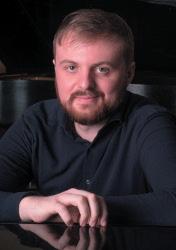
Carrie Henneman Shaw joined the School of Music faculty in Autumn 2020 as artist-in-residence in the Voice program. As a singer, Shaw engages in a wide variety of musical projects, but she focuses on early and contemporary music.

A sample of her work includes an upcoming solo recording on Naxos Records of early 18th-century French song; creating music for a live-music-for-dance project with James Sewell Ballet; and
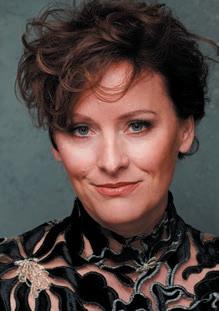
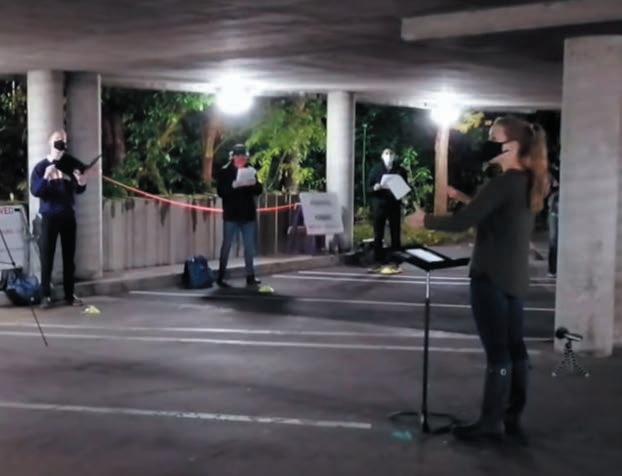
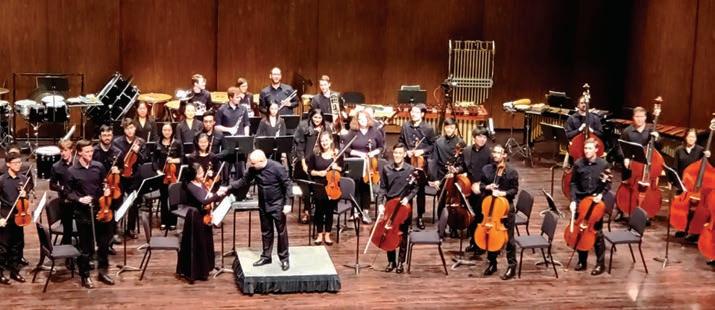
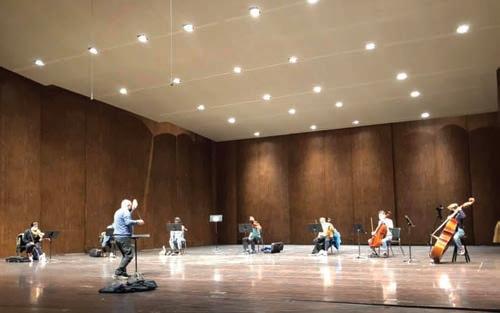
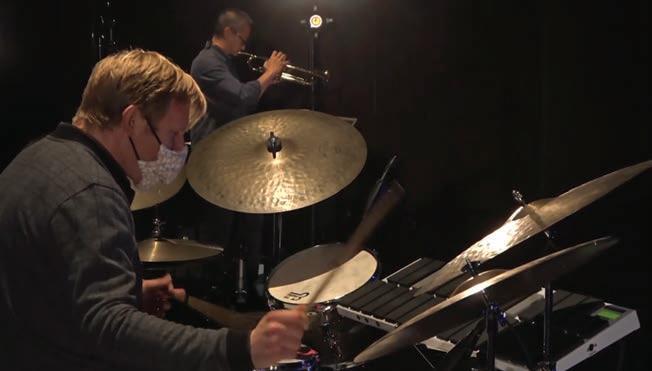
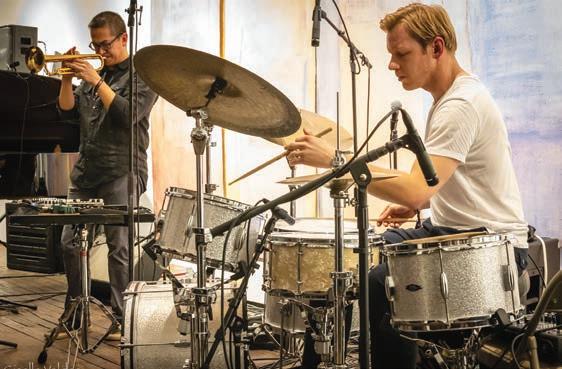
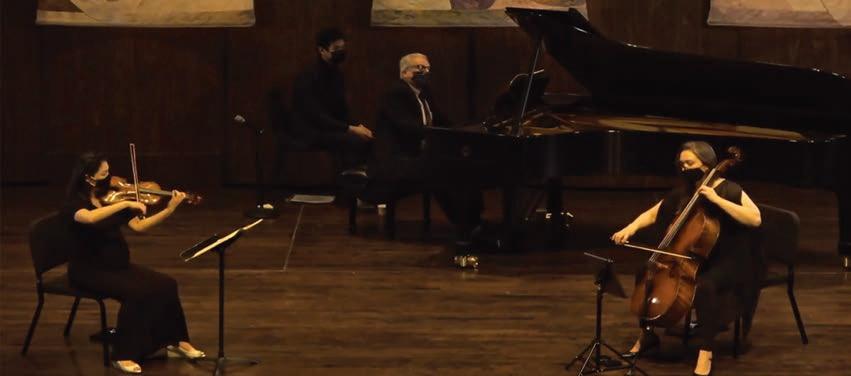
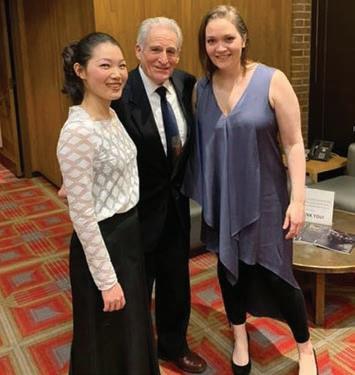
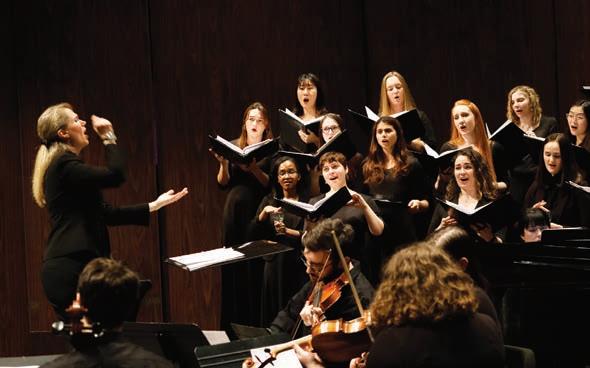
1–2. University Chorale at Meany Theater in Winter 2020; University Singers in the Padelford Parking Garage in Autumn 2020.
3–4. The University Symphony Orchestra at Meany Theater in Winter 2020 and Autumn 2020.
5–6. Jazz Studies faculty colleagues Cuong Vu (left) and Ted Poor in Winter 2020 and in a live-streamed concert in Meany Hall, Autumn 2020.
7–8. Faculty colleagues (left to right) Rachel Lee Priday, Craig Sheppard, and Sæunn Thorsteinsdóttir at Meany Theater in January 2020 and November 2020.
9. Faculty composer and School of Music Associate Director Joël François Durand planning the 2020-21 room schedule in the School of Music “Fishbowl,” Winter 2020.

10–11. Student ensemble activities in Autumn 2020 included in person and remote performance by Percussion Ensemble and Wind Ensemble,
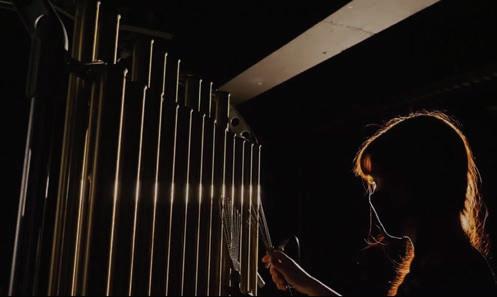
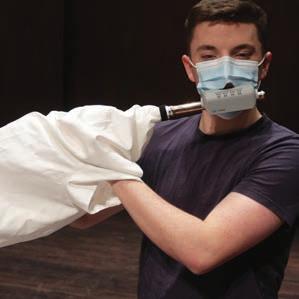
among dozens of other groups.
12. The Marc Seales Group performed at Seattle’s Town Hall in Autumn 2020 in a digital studio session hosted by KNKX radio and led by Jazz Studies Professor Marc Seales (right). Group members included guitarist Jesse Seales, drummer and Jazz graduate student Alek Gayton, and UW artist-in-residence bassist Steve Rodby
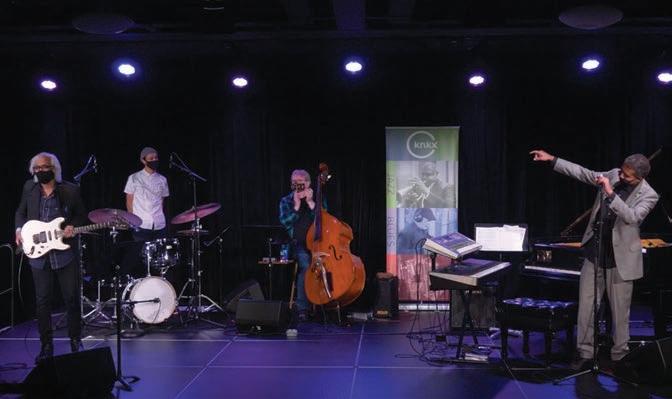
13. Music Room 213 in Autumn 2020.
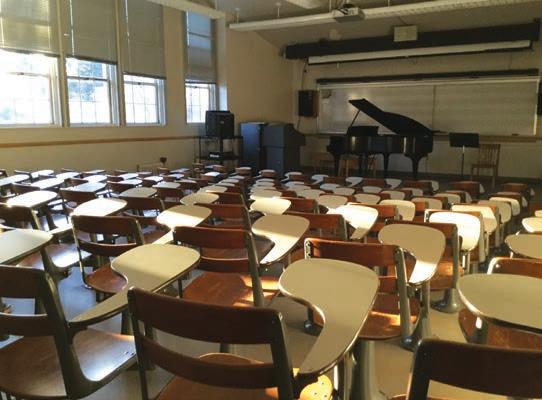
14. Music History students and faculty connected over Zoom videoconferencing in Autumn 2020.
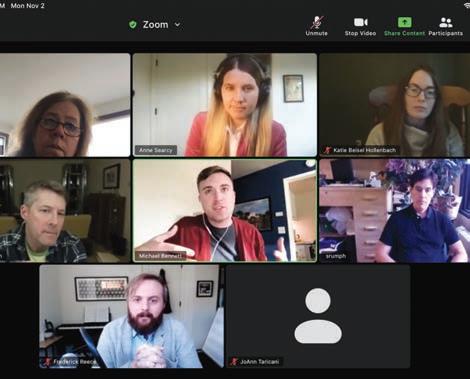
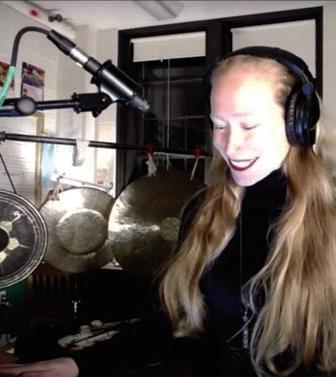
15. Percussion Studies Chair Bonnie Whiting and students of the UW Percussion Studio collaborated with percussion students at California Institute of the Arts, Autumn 2020.
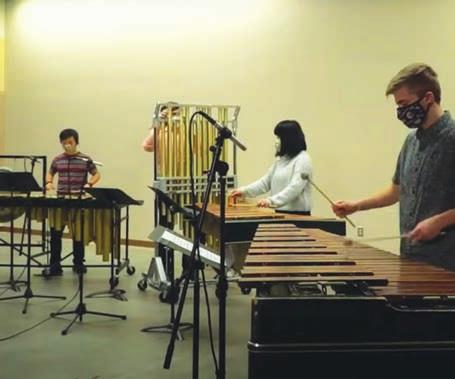
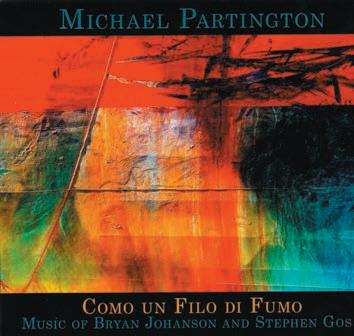
The UW faculty guitarist’s tenth CD showcases the work of American composer Bryan Johansen and Welsh composer Stephen Goss. The five songs included on “Como Un Filo Di Fumo” were inspired and premiered by Partington, and the guitarist has since performed the works in various settings—both live and virtual. Johansen’s “Elegy” and Sonata No. 4 create a foundation of melodic moodiness with Goss’s gorgeous “Watts Chapel” closing out this set. (Rosewood Recordings)
The drummer makes his mark as a songwriter and bandleader in his debut release on the New Deal/Impulse label. Joined by saxophonist Andrew D’Angelo, who shares songwriting and arranging credits on eight of the nine tracks, Poor brings his formidable technique and melodic sense to this work, co-produced by guitarist Blake Mills with appearances by guest musicians Andrew Bird and Rob Moose. In his review of the album, Chris May of All ABout Jazz deemed You Already Know “the sort of album which gives minimalist jazz a good name.” (New Deal/Impulse)
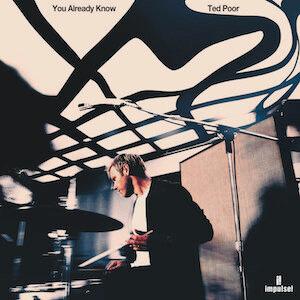
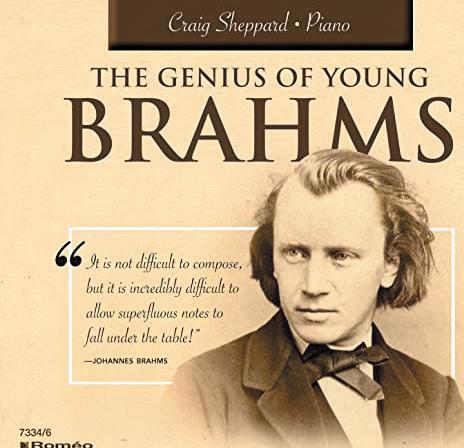
A new release from faculty pianist Craig Sheppard explores early works by Brahms, recorded live at the UW’s Meany Theater in 2012 as part of the pianist’s “Mostly Brahms” series. Sheppard creates a bookend to his earlier CD drawn from the same concert series, “Late Brahms, Opuses 116-119,” with this collection of music written by the composer as a young man, ordered by disc into sonatas, variations, and character pieces. (Romeo)
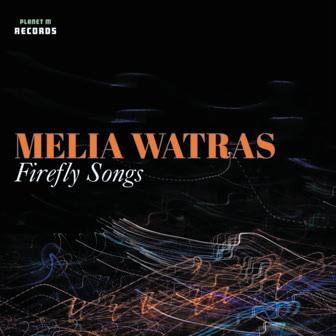
The faculty violist’s 2018 Folk Style Project takes wing in a new album of her own compositions, Firefly Stories, set for release in January 2021 by Seattle-based Planet M Records. Watras is joined in these performances by a cast of talented players, including the ensemble Frequency (Michael Jinsoo Lim, violin and voice; Melia Watras, viola and voice; Sæunn Thorsteinsdottir, cello), and voices Catherine Connors and Vina Vu Valdés. A range of settings from virtuosic to whimsical includes excerpts of recorded viola lessons delivered by violist and educator Atar Arad, Watras’s longtime teacher. (Planet M)
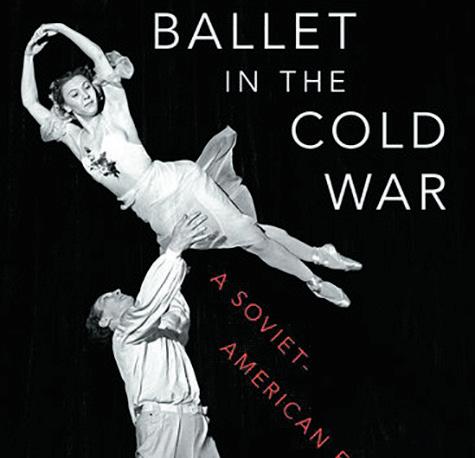
Drawing on both Russian- and Englishlanguage archival sources, Music History professor Anne Searcy’s book suggests new ways to understand both Cold War cultural diplomacy and twentieth-century ballet through an investigation of the cultural exchanges between the two nations in the late 1950s and early 1960s. Scholar Kevin Bartig of Michigan State University declares Searcy’s book “essential reading for anyone interested in the arts during the Cold War and the effects of culture on global politics.” (Oxford University Press)
Percussionist and composer Bonnie Whiting’s Perishable Structures places works for speaking percussionist within a context of storytelling. Through works by Rzewski, Globokar, Parenti, Logan-Greene, and Whiting herself, the album investigates the intertwined relationship between spoken and musical narrative and the unique role that percussion plays in this repertoire. (New Focus Recordings)
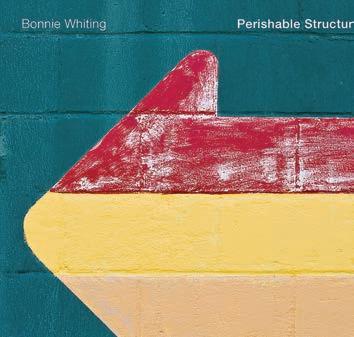
UW Music faculty report new publications, recordings, appointments, presentations, and more in their recent work at the UW and beyond.
The UW professor of choral conducting developed a summer workshop series for music educators, “Keep Our Choirs Singing,” in response to the COVID-19 pandemic. The series of three multi-day workshops was designed to equip choral directors to run rehearsals in a virtual environment. Dr. Boers also recently taught concepts at the Washington American Choral Director Association (ACDA) Summer Institute, the Oregon Summer ACDA Workshop, and delivered master classes with Arizona State University, Oregon State University, and numerous school districts. Professor Boers’ Choral Literacy and Skills Rubric was adopted this past year by National Association for Music Education as its recommendation for choral performance skills. He reports that the rubric has also been adopted by Choral Canada as its national standard for Canadian choral classrooms and has been translated into French.
The UW saxophone instructor led the Seattle Repertory Jazz Orchestra (SRJO) in a series of livestreamed concerts this summer and fall, playing three concerts in tribute to jazz composer Thelonious Monk that were broadcast from the stages at Seattle Town Hall, the Kirkland Performance Center, and the Seasons Performance Hall in Yakima, Washington. The SRJO (founded in 1995 by Brockman along with drummer/educator Clarence Acox) opened ts 26th anniversary season with a concert broadcast from the Taper Auditorium at Benaroya Hall, featuring music of the classic 1949 album by Miles Davis, Birth of the Cool. In April, Brockman was inducted into the Seattle Jazz Hall of Fame during Earshot Jazz’s annual Golden Ear Awards ceremony. The award recognizes Brockman’s contributions to the Seattle jazz community through his work a saxophonist, teacher, band leader, and co-founder and co-artistic director of the Seattle Repertory Jazz Orchestra.
Two new publications by Professor Campbell came out within a week of one another this autumn: World Music Pedagogy: Teaching World Music in Higher Education (Routledge, with William J. Coppola and David G. Hebert) and Global Music Cultures (Oxford University Press, with Bonnie C. Wade). She is featured in a third book out this autumn, the fifth edition of World Music: A Global Journey, by Terry E. Miller and Andrew Shahriari), in a two-page description of her dedicated work in teaching music of the world’s cultures in schools and university programs. Professor Campbell has been named to the editorial board of Ufatiti: Journal of African Perspectives, adding to editorial board appointments with Ethnomusicology (the journal
of the Society for Ethnomusicology), Research Studies in Music Education (Australia), and the British Journal of Music Education.
In February, she joined with UW Music Education faculty, students and alumni in Yakima at the 2020 Washington Music Educators Association (WMEA) conference, where she was awarded the Association’s Teacher of the Year in the higher education category. Professor Campbell’s article in Arts Education Policy Review, “At the nexus of ethnomusicology and music education: Pathways to diversity, equity, and inclusion,” was featured in the special Spring 2020 issue on Globalism and the Arts: Implications for Policy.
The UW’s director of piano accompanying was one of four participants invited by the National Association of Teachers of Singing (NATS) to speak in a special edition NATS Chat in March 2020. The virtual panel session, “The Collaborative Pianist During COVID-19,” was a live-streamed discussion of issues facing collaborative pianists in pivoting to a “virtual world.”
The chair of the UW Guitar studies program released his tenth solo CD, Como un Filo di Fumo, featuring world premiere recordings of music dedicated to him by Welsh composer Stephen Goss and American composer Bryan Johanson. Partington also appeared at the 2020 Guitar Foundation of America festival as a featured artist, presenting a concert, technique workshop, and live question-and-answer session in this year’s virtual festival.
David Alexander Rahbee, Orchestral Activities,
The senior-artist-in-residence received three awards in 2020 from the American Prize non-profit national competitions in the performing arts for his work with the University of Washington Symphony Orchestra. Awards included a first prize in Orchestral Conducting (college/university division); a second prize Vytautas Marijosius Memorial Award in Orchestral Programming (college/university division); and third prize in Orchestral Performance. The awards, based on submissions of video and audio recordings of the orchestra’s 2017-2018 season, are the most recent in a string of recognitions from the Hat City, Connecticut nonprofit.
The Music History professor recently signed on to edit the Cambridge Companion to French Art Song, set for publication in 2023.
Anne Searcy, recently appointed assistant professor of Music History, published a book, Ballet in the Cold War: A Soviet-American Exchange, with Oxford University Press. Press coverage included a review in the Wall Street Journal ’s Fall 2020 Book Preview and an interview with Searcy on BBC Radio Three’s Music Matters program.
The recently appointed artist-in-residence taught and performed in a weeklong digital residency this past October at Depauw University, where she worked with young composers and singers learning about
contemporary vocal music and the business of freelance performance. A member of the acclaimed Chicago-based Ensemble Dal Niente, Shaw recently traveled to Chicago to record a concert of works by living Latin American composers with the ensemble for the Library of Congress’s Concerts from the Library of Congress series. In November, Shaw was heard in the digital premiere of a new work by Annie Hui-Hsin Hsieh, Amplified Traces, featuring dancer/choreographer Veronica Santiago Moniello and Quince Ensemble. Shaw appears as the soprano soloist in a joint concert, presented by Minnesota Orchestra and Border Crossing on Dec. 11, of a bilingually adapted program of selections from Handel’s Messiah and Ariel Ramírez’s ‘Navidad Nuestra.’
His latest recording, The Genius of Young Brahms, is out now on Romeo Records. The threedisc set is drawn from the pianist’s “Mostly Brahms” series of performances presented from 2010-2012 at the Meany Center for the Performing Arts on the University of Washington campus. Sheppard creates a bookend to his earlier CD drawn from the same concert series, “Late Brahms, Opuses 116-119,” with this collection of music written by the composer as a young man, ordered by disc into three areas—sonatas, variations, and groups of character pieces.
Sæunn Thorsteinsdóttir, Cello
Assistant professor of cello Sæunn Thorsteinsdóttir extended her immersion in the six cello suites of J.S. Bach this past summer, performing six suites in six churches one day in June in the Westfjords of Iceland. Though her planned recital of the suites in May at Meany Hall was canceled due to the COVID-19 pandemic, she performed three of the suites virtually on the date of the scheduled performance in a broadcast on the School of Music’s YouTube channel. In Autumn Quarter, she joined colleagues Craig Sheppard and Rachel Lee Priday in a recital of Beethoven piano trios livestreamed from the UW’s Meany Hall. She was recently appointed Chair of the UW Strings Program.
John Vallier, Ethnomusicology
Affiliate faculty and ethnomusicology curator John Vallier co-published with Hiromi Lorraine Sakata and Laurel Sercombe the chapter “Radio Afghanistan Archive Project” for The Oxford Handbook of Musical Repatriation (2019). Vallier also served as a curator and executive producer for the double-LP release of “Kearney Barton: Architect of the Northwest Sound” on Light in the Attic Records (2020) and continues to oversee an Andrew W. Mellon Foundationsupported grant to digitize and return copies of early cylinder and disc recordings to Indigenous communities of origin.
The faculty pianist performed the world premiere of composer Carlos Sanchez-Guttierez’s “Short Stories II” for piano, strings, and percussion with the Seattle Symphony this past February. She performed with the Seattle Modern Orchestra for the 2020 Earshot Jazz Festival and in the world premiere of composer Wayne Horvitz’s “188 Sullivan,” produced in conjunction with Seattle Opera. Valdés was a featured performer on the 2020 New Music Gathering Festival, performing the virtual world premiere of faculty colleague Melia Watras’ composition Otra vez, which was written for her.
Melia Watras, viola
The faculty violist’s new album of her own compositions, Firefly Songs, is set for release by Planet M Records in January 2021. The album features performances by the ensemble Frequency (Michael Jinsoo Lim, violin and voice; Melia Watras, viola and voice; Sæunn Thorsteinsdottir, cello), and voices Catherine Connors and Vina Vu Valdés, as well as excerpts
Professor Emeritus James Caldwell Carlsen died June 11, 2020 at the Odd Fellows Home in Walla Walla, Washington. Founder and director of the University of Washington’s Systematic Musicology Program, he served on the Music Education faculty from the late 1960s until his retirement in 1994.

Recognized worldwide for his leadership in psychomusicology, research methodology, and music education, Dr. Carlsen was well-known on campus and throughout the world for the substance, insight, clarity, and humor of his lectures on psychomusicology and research.
In addition to serving in an editorial capacity for several scholarly journals, such as the Journal of Research in Music Education, the Japanese Journal of Music Perception and Cognition, and Psychomusicology, Dr. Carlsen held key leadership roles in a number of research and professional organizations. His many honors include a Danforth Teacher Fellowship, two International Research Exchange awards, and a Fulbright fellowship.
“James Carlsen established the Systematic Musicology program at UW when few in the music academy had the foresight to establish a program of research and teaching that embraced the tools and philosophy of the scientific method,” says David B. Williams, a 1970s alumnus of the doctoral program. “For those of us who were fortunate to study under his mentorship, he helped instill in us skills and a healthy mindset founded on rigorous methods of inquiry, a clear sense of the importance of theory development, and a passion for seeking answers to a richer understanding of the music experience.”
Dr. Carlsen is honored at the School of Music by way of the James C. Carlsen Scholar in Music Cognition and Learning, which over the past decade has supported the research of UW students and faculty and brought noted guest scholars in the field of music cognition and learning to the UW to work with students and faculty.
“For over 20 years, James and I had adjoining offices in different locations in the School of Music,” wrote his longtime UW colleague Barbara Lundquist, on a website dedicated to Dr. Carlsen’s remarkable life. “Our lives intertwined in countless visits, events, and projects for which I am grateful. His influence on me is incalculable.
of recorded viola lessons given by violist and educator Atar Arad. Recent performances of compositions by Watras included the world premiere of Otra vez for piano, performed by Cristina Valdés on New Music Gathering’s festival, 2020 Reimagined; Prelude for viola solo, performed by Tawnya Popoff for Weekend of Chamber Music Summer Music Festival, 2020 Foresight; the world premiere of Contemplation of Beethoven’s Op. 18, No. 4 for string quartet, commissioned and performed by the Avalon String Quartet on the Northern Illinois University Faculty Recital Series; Homage to Swan Lake for violin solo, performed by Michael Jinsoo Lim and presented on the opening program of Pacific Northwest Ballet’s Digital Season 2020-21; an appearance on the Wayward in Limbo series, presented on SoundCloud, in which she and Michael Jinsoo Lim performed 12 violin and viola duos that are part of Watras’s collection The almond tree duos; and the world premiere of Echo for violin solo, commissioned and performed by Rachel Lee Priday on the Town Hall Seattle series, Town Music.
His co-authored article, “Music stimuli in mindfulness meditation: Comparison of musician and non-musician responses,” was recently published in Psychology of Music. In June, the visiting assistant professor of Music Education, offered a Zoom presentation, “Online Composition for Large Ensembles,” for the music education membership of the Association for Music in International Schools. The presentation featured a composition project with the UW Bands.
Chair of Percussion Studies/Assistant Professor of Music Bonnie Whiting is one of the 2019/20 Mellon Faculty Fellows in the Arts, working collaboratively with DXARTS Assistant Professor Afroditi Psarra and Design Assistant Professor Audrey DesJardins on an interdisciplinary project involving transcoding data from voice assistants and other IoT devices as performance. The artists presented some of their work in Berlin as part of a workshop, Adversarial Hacking in the Age of AI, at the Transmediale Festival. Whiting has continued her work with percussionist Jennifer Torrence, making two trips to Norway for performances of new commissions at the Arne Nordheim Festival, NyMusikk Trondheim, and VEGA Scene, and workshops with students at the Norwegian Academy of Music. Closer to home, she recently joined Seattle Symphony Artist in Residence cellist Seth Parker Woods in a duo recital at the SSO’s new Octave9 performance space at Benaroya Hall.
Professor Wyers has directed several master classes and delivered online talks and lectures in recent months. In April she was guest speaker at Montana State University in its online conducting class, “Laban Movement for Conductors: An Introduction.” Other lectures and classes included “Discovering 19th century choral music from the Philippines, Latin America and Spain,” at the University of Iowa; a guest lecture on women choral composers for Mastersingers of Wisconsin; a class on choral arranging at Northern Illinois University; and a three-week intensive on group choral composition techniques, at Western Washington University. Future engagements include a return virtual visit to University of Iowa in early December for a lecture, “Best Practices when Commissioning Living Composers.”
The School of Music director of Admissions and Outreach, who also holds a PhD in Musicology, recently presented research at several conferences, including the Society for American Music (summer 2020), MoPOP Pop Conference (summer 2020), and the American Musicological Society (fall 2020). Her research examines American fan practices and popular music during the 1940s.
Renowned concert pianist and Professor Emeritus Bela Siki died on October 29, 2020 in Seattle. His former student, School of Music Professor Robin McCabe, remembers him in this tribute originally published in the Seattle Times.
“A teacher affects eternity. He can never tell where his influence stops.” Henry Adams
Bela Siki, the man and his music, made the world a better place. He touched the minds and hearts of legions of gifted students over the years, creating an enduring, indelible legacy in all the music-making that will continue into the future.
Courtly, elegant, Professor Siki, as a teacher, chose his words and gave advice carefully, leanly. As a consequence, we students hung on every syllable. And I always lobbied for the last lesson of the day, hoping that I might be able to wheedle some extra time from him! He has been a significant, major presence in my life for the past five decades.
Bela was a world-class artist, touring, recording and performing throughout the globe. But the pianism was always in service and homage to the music itself. His intellect, integrity and personal principles informed all his actions and attitudes. He was a devoted husband and father, but in the piano lesson, it was clear that he was completely and optimally focused on the student and the potential for learning and discovery. “Teaching,” he often remarked to me, “ has to be essentially selfless. All the art of the suggestion has to be harnessed for the student.”
Now Bela has left us for another sphere, but I am confident that he is still tossing off the Liszt Dante Sonata, and the Franck Symphonic Variations, with the deft panache of a sword- swallower. He has now joined George Eliot’s “The Choir Invisible, whose music is the gladness of the world.” Our lives are all the richer for having known him.


Students and faculty at the School of Music performed and studied music in Autumn 2020 with some dramatic modifications to format and staging. With nearly all classes held online, music students worked and studied from around the globe but also in some specialized settings on the University of Washington campus.

On-campus rehearsals for the school’s large choir and instrumental ensembles in Autumn Quarter required stringent safety protocols developed in tandem with state and UW guidelines, the University Office of Environmental Health and Safety, and schools of music nationwide. Several national and international performing arts education organizations combined resources to study the effects of COVID-19 aerosol transmission in performing arts performance settings, and a joint study from the Universities of Colorado and Maryland provided an early framework for educators preparing over the summer to develop v iable options for their students to continue performing and studying during the pandemic.
“Every student and faculty musician who has been involved in live rehearsal and performance has taken the safety measures very seriously, which has allowed the ensembles to continue all quarter,” says School of Music Director JoAnn Taricani. “It is remarkable to see how they have adapted.”
The challenge of locating large enough spaces for adequate distancing led UW Choirs to hold Autumn Quarter rehearsals in the University’s Padelford parking garage, an open-air environment offering the extra ventilation and spacing required of singers, with members broken into smaller groups meeting on alternate days.
The UW Symphony Orchestra and Wind Ensemble, meanwhile, gathered in small, masked and distanced groups arrayed throughout Meany Hall and took advantage of extra stage time to prepare video and audio recordings for later broadcasts. Beyond physical distancing and mask-wearing, ensemble members took additional precautions: frequent hand sanitizing, instrument masking, special face masks, and 30-minute breaks between 35-minute rehearsal blocks to enable the HVAC systems to turn over the air in each space after use.
Wind Ensemble director Timothy Salzman spent the summer preparing for an unprecedented academic year that ultimately included sewing. Along with his wife Jodi, he embarked early on a plan to outfit an ensemble of wind instruments—some of the most concerning in relation to aerosol emissions—in shrouds and masks intended to mitigate risk while still enabling music-making. The pair worked to hand-sew some of the instrument masks when shipments of masks Salzman had ordered were delayed due to massive demand from music programs world wide. The extra layers of protection have created an environment in which performing on wind instruments is possible for the 50-plus students in the group.
Meeting live throughout the quarter in small chamber groups, members worked to prepare chamber music as well as recorded versions of the student compositions created during Spring Quarter 2020 in Salzman and composer Alex Shapiro’s ‘WeZoom’ experiment, a course syllabus now adopted by at least 20 universities and numerous public schools nationwide. A significant segment of the ‘WeZoom Project’ involves collaboration with the UW Department of Dance and the Department of Dance at Rutgers University, Salzman says, and the studentproduced/composed multi-media performance of the suite of pieces from spring term, titled illuminisolation, were released in Winter Quarter 2021.
David Alexander
director of the University of Washington Symphony Orchestra, used the extra time on the Meany Hall main stage to finetune several chamber arrangements of repertoire by Bartók, Caplet, Enescu, and Sibelius and to document his own and the students’ work via audio and video recordings. He released several of those works throughout Autumn Quarter on his own YouTube channel.
For the UW Percussion Studies studio and chair Bonnie Whiting, the challenges of distanced learning in Autumn Quarter led to an innovative collaborative performance project with University of California Institute of the Arts, with students from both institutions performing and rehearsing live over a network throughout the quarter. The groups presented their work in December 2020 in a pair of prerecorded virtual performances.

“ The centerpiece of the program was Anthony Braxton’s C omposition 221 + 246, in collaboration with students at the California Institute of the Arts,” Whiting says. “I’m very proud of the way we made this work, even with folks in three different states. CalArts also streamed a longer version of the Braxton (encompassed in his Ghost Trance Music) on the 13th, so we had a very nice exchange and a mini-festival celebrating music-making in our radically-changed environment.”
In the radically changed environment of a music school weathering a world pandemic, new collaborations are born, new skills and

technologies embraced, and unexpected upsides are revealed.
“I don’t think I’ve ever played a concert where I’ve been able to warm up on stage right until ten seconds before we went live,” said faculty cellist Sæunn Thorsteinsdóttir in a discussion following her Nov. 16 Meany hall concert with colleagues Craig Sheppard and Rachel Lee Priday, performed in an empty theater. “I have to say, that’s a positive.”
Priday agreed and added her own thoughts, widely shared among musicians and scholars at the School of Music: “Almost a year, three quarters of a year, into the pandemic, we’re still figuring out how little details affect us when we are performing,” she said. “We spent our lives kind of learning a certain way to perform, and little things make such a difference. Even just the spacing and sight lines really do make us adjust, but we are just really grateful to be able to do this.”
Bridgit Long, a School of Music master’s student in oboe performance and a key producer of the Wind Ensemble’s illuminisolation project, summed up in her abstract for the project the aims and inherent optimism of the new curriculum: “illuminisolation is a fresh and creative conjunction of music, technology, and collaboration,” she wrote. “It represents how even during these difficult times, instead of being driven apart, we might continue to connect with each other through art and music.”
Rahbee, UW Choirs held octet rehearsals in the UW’s Padelford parking garage in Autumn 2020 (Photo: Courtesy Geoffrey Boers).
Soprano Carrie Henneman Shaw began a new faculty appointment at the University of Washington this fall, adding a base in Seattle to her artistic communities in Chicago and St. Paul/Minneapolis. Considering her interests in new and experimental music and involvement with early music, she is uniquely suited to collaborations with composers and artists on the faculty of both the School of Music and UW Digital Arts and Experimental Media. Creator and performer of various live-music-fordance projects, she also performs as a member of Chicago’s esteemed chamber ensemble Dal Niente.
This interview was conducted via email correspondence between Carrie Shaw and School of Music publicist Joanne DePue.
Q: You already are part of vibrant artistic communities in Chicago and the St. Paul/Minneapolis area. What attracted you to the idea of joining the UW School of Music faculty and making a move to Seattle, Washington?
Chicago and Minneapolis-St. Paul are incredible cities in which to be an artist. Ten years ago, as my career was taking shape, I was wracked with uncertainty about where I should live —Chicago or Minnesota— until one day I realized I didn’t have to choose. I just needed to decide I wanted to make art in both these places and get down to it. That doesn’t mean it’s been easy, and I needed lots of coffee and a flexible schedule to make those seven-hour drives, but what has made my work “go” is to identify my passions and find artists and audiences who share those passions. Flights have gotten cheaper, and the distance has become smaller too as connection via social media has become ubiquitous.
I’ve been in and out of Seattle as a musician for years, and there’s just something about the creative community here that makes me feel at home. I grew up in rural Kentucky and wasn’t exposed at an early age to the classical pantheon and the traditional culture of classical music, so I’ve always gravitated towards cultures of innovation and resistance to limiting traditions. Seattle feels like one of those places, and I’m excited to find out where connecting my past, present, and future colleagues leads!
Q: Early music seems also to be a specific focus for you. I’ve noticed that musicians who are interested in new music often have a concurrent interest in early music. What are some of the areas of overlap in these two genres separated by centuries that appeal to composers and musicians who are excited by experimentation?
Yes, I fell hard for early music in high school, before I knew what ‘early music’ was. At age 16, Vivaldi was the most psychedelic thing I’d ever heard. It rocked my world. My voice—which is light, bright, and flexible—always clicked with early music, so it was very satisfying to perform. When I started studying at the college level, I had a real intuitive connection to the expressive intent of Baroque harmony, and later when I discovered Baroque improvisation styles, that sealed it. I was hooked.
The athletic part of music undeniably plays a role in drawing certain musicians to early and new music. Much early and new music for the voice prioritizes clarity over color for a variety of reasons. It would be too simplistic to say that all new or Baroque music is defined by this leaning, but a large number of composers since 1920 seem to
continued
collaborating on a recording with the band Deerhoof. Shaw is a twotime winner of a McKnight Fellowship for Performing Musicians, and she is a member of two groups that focus on music by living composers, Ensemble Dal Niente, a mixed chamber collective, and Quince Ensemble, a treble voice quartet.
Jordan Anderson is artist-inresidence in the School of Music Strings program beginning in Autumn 2020. He has served as Principal Bass of the Seattle Symphony Orchestra and Seattle Opera since fall 2000. He has also served as Principal Bass of the Bellingham Festival of Music Orchestra since 2015.

Anderson has soloed with the Seattle Symphony, Cascade Symphony Orchestra and Seattle Chamber Orchestra. In April 2013, Anderson performed his composition Traction for Solo Double Bass at [untitled], the Seattle Symphony’s new music series. In November 2007 he performed the Washington State premiere of John Harbison’s Concerto for Bass Viol and Orchestra with the Seattle Symphony.
Recent music festival appearances include performances at the Seattle Chamber Music Society where he is a frequent participant at their summer and winter festivals. A Anderson’s awards include Grand Prize in the David Walter Memorial Double Bass Composition Competition. He is passionate about teaching and enjoys playing recitals and giving master classes around the United States. Anderson has a Bachelor of Music degree from the Curtis Institute of Music, where he studied with Harold Robinson, Principal Bass of The Philadelphia Orchestra.
prefer a voice with less vibrato, laser-sharp pitch accuracy, a sense of effortlessness in the face of acrobatic aural tasks—in other words, a sound that’s distinct from the traditional Classical/Romantic operatic aesthetic. I’d have been happy if I had been born with a voice for Verdi too, but when there’s so much amazing music in the pre-Mozart and post-Strauss world, I’ve never felt like I’m missing out.
Q: What might your students expect in their one-on-one lessons with you and/or their master class/workshop time?
My one-on-one students can expect a lot of kinesthetic awareness work: observe very small movements in their own bodies and in the bodies of top-level singers; observe how physical bodies and music mutually influence the viewers’/listeners’ perceptions; observe how their bodies either work for them or against them when they perform. Also I’ll encourage students to cultivate their natural inclinations while enriching themselves with new (maybe unfamiliar and difficult) skills. We’ll cover a lot of ground stylistically and also work on learning to articulate oneself well about one’s work to any sort of audience, professional or casual.
More than ever before, my students can expect to be asked to record themselves and assess what they hear and see, as well to develop tastes about the recordings they see and hear on the internet. It can be terribly painful and personally difficult to learn this skill, but it’s a band-aid that eventually has to come off. Especially with the unknown extent of the potential interruption of live music performances, one can’t sit back and wait for ‘normal’; we’ve got to keep creating. Furthermore, building up one’s ability to adapt to new modalities can be nothing but an asset.
An extended version of this interview appears in the Spring 2020 issue of Quarter Notes, the School of Music’s quarterly electronic newsletter.
UW Choral conducting Professor Giselle Wyers, a member of the editorial board of the C horal Journal, the leading publication of the American Choral Directors Association, reports that the November 2020 issue of the journal focuses on the theme of “Sounds of Blackness,” the first of two Choral Journal issues exploring Black history, music, and composers.
G uest editor Brandon Boyd highlights concerns related to racial inequality, using this journal issue to emphasize the strength of the Black repertory in choral music, and reaching back in history to consider racism in the Spanish Baroque period. The lead article in the journal, by author Jason Dungee, challenges conductors to implement a restorative, anti-racist pedagogy in the choral classroom, while Marques Garrett broadens the perspective on choral music by Black composers. Further, every review in the issue highlights compositions by Black composers.
P rofessor Wyers further amplifies the journal’s consideration of issues of Black choral music by observing that “leaders in the choral field are working hard to identify and combat systematic inequalities in our approaches to music, as well as finding new ways to promote and support more diversity, especially in our programming and hiring practices.” The December 2020 issue of the Choral Journal w ill provide further insight about this crucial field of study.
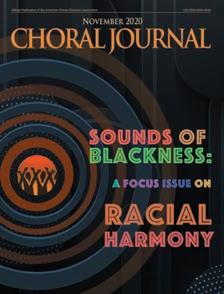
Composition professor Richard Karpen’s term as director of the School of Music ended June 30 after 11 years leading the school and its people and programs. During his tenure, the School of Music appointed new faculty in a range of programs, including Percussion Studies, Jazz Studies, and Strings, placed an emphasis on faculty research in the realms of Baroque music and new and experimental music, grew the UW’s Jazz Studies program, fortified longstanding ties between the School of Music and Seattle Symphony, hosted a five-year residency by the Harry Partch Instrument Collection, and brought guest artists from around the world to the UW to work and perform
This conversation between Dr. Karpen and School of Music publicist Joanne DePue was conducted via email and has been edited for length
Q: Looking back on the past 11 years, what are some of your proudest accomplishments from your time as director?
A: Our primary mission is to give our students guidance and room to explore, to learn, and mostly to give them the support they need to learn about their own ways of learning. Next, and not at all far behind, is our research mission – the discovery of new knowledge and new methods of discovery. The teaching and research missions are of course intertwined and often act as one. There are so many accomplishments that all of us in the School can be proud of. An overall goal that I feel we have met was to create a more porous and dynamic boundary between campus and community (from local to global): hosting residencies with the Baroque music group Pacific MusicWorks, with the Harry Partch Instrumentarium, with Ludovic Morlot as chair of orchestral conducting, expanding the musical range and the number of visiting artists and scholars from around the world who have become part of our larger musical family. And in the midst of all this, we have been able to add a significant number of
Q: If you knew now what you didn’t know then, would you still accept the director position? Elaborate.
A: I would not only accept the position, I would not hesitate and ponder the decision so, as I did at the time! It has been a challenging assignment for sure. I started in this role in 2009 during the Great Recession with the need to hit the ground running to reorganize, cut budgets, and find new resources. I don’t take well to limitations on what we are able to do to in the Arts! So, I was not about to simply have the School retrench. With the collaboration of great colleagues and our intrepid students who were ready to keep climbing the mountain in the middle of a cold rain, we emerged with our values intact, more nimble than ever, and ready to soar. I’m grateful to have been a part of that. And now, as the School transitions to its next director, in the midst of another severe and very complicated time of crisis, I feel quite sure that our nimble and spirited ways will bring us through again!
Q: W hat was the defining moment or turning point that set you on a course toward a life in music?
A: I grew up in a working-class family. My father, who did not finish high school, but who was “street smart,” eventually became an oil furnace service person. I went to work with him when I was quite young and did that work on my own as a teenager and into my early twenties. I worked in the basements of the very affluent and of the very poor. In that kind of work back then, there was very little protection against the unhealthy aspects of this job, and we would emerge from cleaning a furnace covered in soot, soot up our noses and in our throats, fuel oil all over us! My grandmother with her “old-fashioned” ideals made sure that my parents had a piano in our home. I taught myself to play (having learned to read music in public school), learning some pretty difficult music by rote

(a Rachmaninoff prelude comes to mind!). Someone noticed that I could play and soon after I had a piano teacher. The turning point was probably the angel (one of many I have had along my path) who said to my parents on hearing me play, “Oh, is Richard taking piano lessons?” I guess it startled my parents, and it set things in motion. I was around eleven years old.
Q: What are you reading now?
A: The Hebrew Bible and Italo Calvino’s If on a winter’s night a traveler.
Q: What do you plan to read next?
A: Doris Lessing’s Shikasta.
Q: What are some upcoming projects you are excited about now that you will have more time for your research?
A: An opera with my long-time musical partners, “The Six Tones,” a group consisting of remarkable Vietnamese master musicians and a brilliant Swedish guitarist who is also a master of all things plucked and strummed. We work very collaboratively trying to explore music we don’t ourselves quite understand. Also, a long term creative research project to integrate neuroscience and machine learning into improvisation.
Q: What advice you would offer a new faculty colleague?
A: Be yourself. Don’t wait until you have tenure. We hired you for who you are. Be adventurous. Be the future now.
Q: What advice you would offer a young composer.
A: L earn acoustics and psychoacoustics. Read a lot of fiction and learn a lot about all of the other arts and sciences. There is too much to know but the more you know the more you know. Imagine what your music sounds like to other people, what happens in the imaginations of your audience when they listen to your music, because it is in the inner world of your listeners’ minds/bodies where your music actually comes to life.
Q: What is a film you think everyone should see?
A: There are so many and there is so much to learn from great cinematic works! I’ll just toss out two: Bunuel’s “The Phantom of Liberty” and Hitchcock’s “Vertigo.” And then everything by those two directors and by Fellini, Tarkovsky, Kurosawa, Antonioni…. These are all filmmakers who knew what to do with sound and music, by the way!
A: Getting to know the School’s donors (and I mean all of them; the twenty-five-dollar donor and the million-dollar donor) has been an especial joy. It’s not a part of the job I understood very well at first, but it became one of the most meaningful to me personally. People who write checks to support the School, whether for scholarships for students, support for faculty, gifts of pianos, and so on, do much more than give us the financial means to learn, teach, create. I don’t want to define what that “more” is. It’s just beautiful to be around that spirit and it makes us all better and I thank them all. And last but not least, I thank students, faculty, and staff of the School, those still at the School, those who have moved on, with special reverence for those who are no longer with us on the planet.
Dr. Karpen’s successor, Music History Professor JoAnn Taricani, assumed the directorship of the School of Music on July 1, 2020.
World-renowned clarinetist and composer Bill Smith, whom jazz legend Dave Brubeck once called “one of the all-time greats,” died Saturday, Feb. 29, at his Seattle home, of complications from prostate cancer. He was 93.

Known as Bill Smith to the jazz world and William O. Smith in classical circles, Mr. Smith served on the University of Washington faculty from 1966-1997. He was a founding member of the Dave Brubeck Octet, which in 1947 pioneered a blend of classical music and jazz later known as Third Stream and had a profound influence on the development of West Coast, or “cool,” jazz.
Mr. Smith was also a pioneer in modern classical music, developing extended clarinet techniques that included playing multiple notes at the same time and two clarinets at once.
“He was someone who was unafraid to innovate,” said his wife of 42 years, Seattle painter Virginia Paquette Smith. “It was one of the things that drew me to Bill.”
Born in Sacramento, California, in 1926, Mr. Smith grew up in Oakland, where as a teenager he led his own jazz band and played in the Oakland Symphony. Enthralled by swing clarinetist Benny Goodman, Mr. Smith toured with a jazz band but, after a year, decided he would prefer teaching and composing to life on the road. After a year at Juilliard, in 1946, Mr. Smith transferred to Mills College in Oakland, after hearing that French composer Darius Milhaud would be teaching there.
At Milhaud’s suggestion, he and fellow student Brubeck explored a merger of classical composition and improvised jazz. Mr. Smith performed with Brubeck in the San Francisco Bay Area in the 1950s, rejoining the group in the 1980s. Brubeck recorded two albums featuring Mr. Smith’s tunes, “The Riddle,” and “Brubeck à la Mode.”
In the 1950s, Mr. Smith won the Prix de Paris and the Prix de Rome, composition prizes that led him to study and work for nearly a decade in those European cities. He maintained an apartment in Rome as a summer composition retreat for the rest of his life. After teaching posts at the University of Southern California and the San Francisco Conservatory, in 1966, Mr. Smith was recruited to the University of Washington to start the experimental music ensemble The Contemporary Group, which he and experimental trombonist Stuart Dempster led for several decades. “We had a pretty good time joking with each other,” said Dempster, who shared a whimsical, Zen-like sense of humor with Mr. Smith. “ ‘Have you found wisdom yet?’ I’d say. ‘Nope. Have you?’ ‘Nope!’ ”
Mr. Smith is survived by Paquette Smith; four children from a first marriage — Mark O. Smith, of Georgetown, Texas; Gregory O. Smith of Vitorchiano, Italy; Rebecca Elizabeth Smith of Santa Rosa, California; and Matthew O. Smith, of Vacaville, California; and three grandchildren.
—Obituary by Paul De Barros, Seattle Times, March 10, 2020
We interacted as colleagues and students - and became family and friends. His sense of humor, kindness, patience and insight were consistent. He expected my best, but helped me fix my offerings. He celebrated my enthusiasms and encouraged my creativity, while managing to deal kindly with my differences. I wear the silver ring he made for me most every day. My love and respect for him has worn so very well over my lifetime. I am deeply grateful for our friendship; for James’ presence in my life.” “Jim was a model of wisdom and grace,” Professor Patricia Campbell, chair of the UW Music Education program, said of her former colleague. «Many of us continue to be inspired by his model of teaching and research with integrity, honesty, and respect for all.”
Many former colleagues, students, family, and friends pay tribute to Dr. Carlsen at www. jamescarlsen.com.
Obituary from the Seattle Times
Former School of Music faculty member Clyde Jussila died July 9, 2020. Born in Kent, Washington to Fanny and Matti Jussila, he lived much of his life in Washington State.


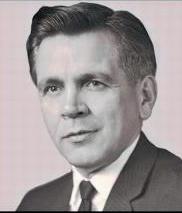
As a young man he grew up in Issaquah where he graduated from Issaquah High School in 1938. Clyde earned his BA from the University of Washington and his MFA Degree from Kansas St. University in music.
In 1942, Clyde enlisted in the US Army, serving in the 3rd Infantry during WWII. He fought in Africa, Sicily and survived Anzio Beach, Italy. He went on to play in the U.S. Army Band.
After the war, Clyde taught music at Kansas State University and at the UW. Clyde enjoyed teaching musicians how to be good teachers. He always kept students’ hearts at the center of his teaching. He wanted his students to love what they did and pass that love of music on to others. Clyde taught many of the Seattle area music teachers over the years and is a member of the Washington Music Educators’ Hall of Fame.
Clyde played violin, viola, trombone and bassoon for many different orchestras in the area, including The UW Symphony Orchestra, The Seattle Symphony and Cascade Symphony Orchestra.
Through the years, he lovingly supported and cared for his mother, sister Darlene (predeceased) and her children. He found the love of his life, Liisa Vasama Ingalls, also of Finnish heritage, and they married in 1997. With Liisa, Clyde travelled and lived in new places. He enjoyed being a part of Liisa’s children’s lives and having an extended family. Clyde gracefully participated in a century-long life, which included the family draft horse, Model T, airplanes, using the internet and owning a hybrid.
He is survived by his wife Liisa, nephew Peter (Angelia), niece Karen (Russ), Liisa’s children (Karen, Johanna, and David), her sister Sirkku, grandchildren, and other relatives. In lieu of flowers, please make donations in memory of Clyde to the UW Music Department.
James Carlsen and late wife Mary Baird, who celebrated 64 years of marriage in 2013. (Photo: courtesy James Carlsen archives) Frequent collaborators: Former longtime School of Music Professors William O “Bill” Smith, left, and Stuart DempsterAcademic appointments, awards, honors, and other artistic and scholarly achievements.
Doctoral student Gabriela Garza Canales (DMA Orchestral Conducting) was recently appointed Music Director of the Poulsbo Community Orchestra, a non-profit volunteer ensemble performing several concerts per year in the North Kitsap community. During her degree studies at the UW, Garza has served as co-conductor of the UW Campus Philharmonia Orchestras and assistant conductor of the UW Symphony Orchestra. In November 2018, she was appointed assistant conductor of the Whidbey Island Orchestra. Recent guest conducting appearances have included engagements with the Seattle Collaborative Orchestra and the Sammamish Symphony Orchestra. She also was selected to participate in Spazio Musica; a four-week opera conducting workshop in Orvierto, Italy under the instruction of maestro Vittorio Parisi. Additionally she participated in the summer Cascade Conducting Master Class with maestro Sarah Ioannides. Gabriela has recently been invited to guest conduct performances with the Sammamish Symphony Orchestra, the Seattle Collaborative Orchestra, the Poulsbo Community Orchestra and the Whidbey Island Orchestra. Additionally, in collaboration with the Ballard Civic Orchestra and with partial funding from the Seattle Office of Arts & Culture, Gabriela recently presented a second performance of her own interdisciplinary project titled [R]evolve.
Orchestral conducting alumna Julia Tai (’10 DMA Orchestral Conducting) was recently appointed Music Director of the Missoula Symphony Orchestra and Chorale. A student of the late UW conducting professor Peter Erös, Tai was selected from among five conductors vying for the position with the Western Montana ensembles. Since completing her UW doctoral studies, Tai co-founded (with School of Music Composition alumnus Jeremy Jolléy) the Seattle Modern Orchestra and serves as music director of Seattle-based chamber orchestra Philharmonia Northwest.
Tigran Arakelyan (‘16 DMA, Orchestral Conducting) served as the assistant conductor of California Philharmonic and made his Walt Disney conducting debut in July of 2019. In his second year as the Music Director of the Northwest Mahler Festival he conducted Mahler’s first symphony. Tigran took the Federal Way Youth Symphony on tour to Korea where he also worked with two youth orchestras from Jeju Island. He recently guest conducted the Lark Orchestra (Los Angeles), Mercer Island Orchestra Festival and the Ballard Civic Orchestra. Tigran continues as Music Director of the Port Townsend Symphony and youth orchestras in Federal Way and Bainbridge.
Kiwa Mizutani and Nicole Stankovic , students of Robin McCabe, were finalists in the Coeur d’Alene Symphony Competition in January. They performed in Spokane, Washington. In December, Mizutani and piano studio colleague Hexin Qiao performed for University Rotary, presented by Professor McCabe
UW Voice students Natalia Valvano and Mavis Chan, students of Carrie Shaw, placed in the divisional competition of the National Association of Teachers of Singing (NATS) competition in October. Chan took third place; Valvano won first place and will be featured in the organization’s Honors Recital in January 2021.
Elisabeth Crabtree, a PhD student in Music Education, was invited by Schott-Music of Germany to write a book of Orff Schulwerk lessons for children, based on Carl Orff’s volumes of Music for Children. The book, tentatively titled Teaching Orff: Lullabies, Rhymes, and Seasonal Songs, is due out in Spring 2021. Crabtree is the current president of the Northern California chapter of the American Orff-Schulwerk Association. Music Education doctoral student Clayton Dahm presented a spoken paper at the annual Society for Ethnomusicology conference. The paper, “Three Senegambian Mandinka Weddings: Mediating Assembled Identities in Musical Performance,” considers musical engagement and the politics of fiscal patronage in West African Mande music, and represents Dahm’s research interest in musical transmission and representation.
Chris Mena, PhD candidate in Music Education, recently served as guest in webinars for the National Association for Music Education (NAfME) and a new group called Decolonizing the Music Room. He is presenting on topics of World Music Pedagogy, the history of Mexican Americans in Music Education, Afro-Peruvian landó, and identity development in the music classroom. He is developing an arts program called ROOTS Framework, working with visual and performing arts teachers in the Seattle Public Schools to develop an antiracist framework for an all-district arts curriculum. Chris is currently teaching guitar and orchestra at Robert Eagle Staff Middle School as well as serving on the music curriculum team for Washington (state) Ethnic Studies Now Coalition (WAESN).
Mike Kohfeld, PhD candidate in Ethnomusicology, is currently at work on their yet-untitled dissertation on space, identity, and performance in the Seattle drag scene, with focus on the use of remix as a process of critical cultural production. They are co-teaching a course on U.S. popular music with the School of Music during Autumn 2020 and will be working as an application reader for the UW Admissions department in winter 2021.
Several Music Education and Ethnomusicology graduate students contributed to a recent special issue of Local Learning, the journal of the National Network for Folk Arts in Education. The UW contingent was invited to contribute to the issue, organized around the theme “Teaching for Equity: The Role of Folklore in a Time of Crisis and Opportunity.” The article, “Let’s Stand Together, Rep My Tribe Forever,” tells some of the story of the UW’s work with its Music Alive! In the Yakima Valley project. Collaborating authors included Kaity Igari, Juliana Cantarelli Vita, Skuli Gestsson, Cameron Armstrong (Music Education) and Jack Flesher (Ethnomusicology). “This is one of about six articles and several book chapters now out in national and international journals of our work in Toppenish, White Swan, and Harrah,” says Music Education Professor Patricia Campbell. “What we do has become a model of practice for others now who work with Indigenous students, and/or the collective song-writing process, and/or children of migrant and second-generation Mexican-heritage families.”
Juliana Cantarelli Vita, violinist and PhD candidate in Music Education, received the Elizabeth May (Slater) Award from the Society for Ethnomusicology for her paper on the topic of archived field recordings for teaching music to children at the UW’s Music Partnership Program at Laurelhurst Elementary School. Her research, ”Childhood, Repatriation, and Sustainability: A 5th-Grade School Music Experience in North America,” examines the relevance of repatriation and repatriated recordings of children’s musical cultures to school music. Her research extends also to the role of women musicians in not only sustaining music through the transmission of traditions, but also pressing into newly expressive forms that communicate messages of activism through a blend of music, poetry, dance, and theater. She received a substantial research grant from the American Orff-Schulwerk Association for continuing work in 2020-21 on collective song-writing within the UW Music Education Music Alive! in the Yakima Valley program. Cantarelli Vita was appointed to The Orff Echo Editorial Board, and has received acceptances for proposals for conferences of the International Society for Music Education and the National Association for Music Education. She was recently appointed a predoctoral instructor at the Spanish and Portuguese Studies department at UW.
Giuilana Conti, violist and PhD candidate in Music Education, completed her term as president of the UW Graduate and Professional Student Senate (GPSS) after five years of service on behalf of the School of Music and all 16,000 graduate and professional students at the University. In the spring 2020 term alone, she developed a three-year strategic plan for the organization, rebuilt the UW’s cross-campus liaison program, developed and disseminated a COVID climate survey to all UW Seattle students, worked with the governor’s office to support graduating professional students with temporary licensure, and produced a 21-session online Grad Career Symposium for all grad students in light of COVID-19 and changes in the job market.
Ke (Kelsey) Guo, pianist, singer, performer of Chinese dizi (transverse flute), and PhD student in Music Education, is specializing in the study and performance of Sephardic song. She was named the Robinovitch Family Fellow by the Stroum Center in Jewish Studies Graduate Fellowship Program for the Academic Year 2020-2021 and was awarded two scholarships to support her study in Ladino language. She also was invited to offer an individual concert of Sephardic music at Castle Fuensaldaña, Spain. She has been working with the local Sephardic Jewish community on a songbook translation project set to be published through digital platform in the coming year. She also is participating in an inter-generational interview project between UW graduate students and local Sephardic community members, to be presented at the International Ladino Day hosted by UW Sephardic Studies in December 2020.
Kaity Cassio Igari, MA student of Music Education, co-authored “Beyond the Music: Collaboration towards Anti-Racist Elementary Music Education,” which is set to appear in the Winter 2020 issue of The Orff Echo.
Music Education alumnus Kevin Clayton, now director of instrumental music at Chiawana High School in Pasco, Washington, has been named the Washington Music Educators Association 2020 High School Music Educator of the Year. As director of Chiawana High School’s band program, which did not exist when he took on the position, Clayton built a music program from scratch over ten years of serving a district of underserved
Sonja Liv Coyman Myklebust, daughter of Carolyn Coyman and Olaf Myklebust, beloved sister to Marit Silje Coyman-Myklebust, passed on January 23, 2020, in Sebastopol, California, after a courageous, year-long bout with brain cancer. Days earlier, on January 12, Sonja celebrated her 34th birthday with a flamingo-themed party, wearing a pink sequined skirt, a feather boa, and a flamboyant, bespoke headpiece adorned with brightly colored flowers and leaves. In her invitation, she asked family and friends to bring “acoustic musical instruments, soft voices and sparkly clothing!”
Sonja’s legacy is vast—her dazzling spirit and generous heart cast a permeating glow. She loved to dance, cultivate gardens, and cook delicious food. She possessed an enduring passion for music and dedicated her life to the mastery of cello. Playing her instrument brought her tremendous joy, as did sharing her love for the art form as a teacher of both adults and children. Sonja believed in music’s power to connect, and she committed herself to reaching people from diverse backgrounds.
Sonja earned a doctorate of musical arts in string performance from the University of Washington in 2017 and a BA in music from Lewis & Clark College in 2008. She joined the faculty at George Fox University in Newberg, Oregon, in the fall of 2016, having taught previously at Edmonds Community College and Seattle Music Partners. She also taught low-income students at Holy Redeemer Catholic School and maintained a thriving private Suzuki cello studio.

In collaboration with the UW School of Music and the UW World Series, Sonja founded the Meany Center’s Music Link program, which brought free live performances to schools and other spaces in Seattle, and trained musicians to be Teaching Artists who innovated ways to engage and educate audiences, going beyond conventional performance. A powerhouse advocate for the ability of the arts to effect change, Sonja employed her tenacious work ethic and unbounded creativity to build concert series and other programs that encouraged community connectedness and access to music.
In January of 2019, Sonja was diagnosed with an aggressive brain tumor, glioblastoma multiforme. She met her diagnosis with a fierce determination to be on a healing journey. Her will to define her own terms and to choose how to view her circumstances reflects the way she approached her life. She spent her last year living at her family home, cared for by her mother and family and receiving constant visits from the many close friends she made throughout her life. Sonja faced her cancer journey with courage, humility, introspection, gratitude, and awe. Her unique sense of humor, intense love of life, and deep concern for those around her endured to the very end.
—From the Santa Rosa Press Democrat
students, eventually elevating the school’s marching band to an award-winning ensemble. WMEA honorees are nominated by the WMEA membership, made up of music educators from across the state. Awards are presented at the WMEA state conference in Yakima in February, 2020.
Recent Guitar Studies graduate Max Shaffer (’20 BM Guitar), now based in Albuquerque, New Mexico, has just released his first album, “Lost to the World,” featuring works from Albéniz, Mertz, Goss, and others. “The title itself is inspired by a poem by Fredrich Rückert (I am lost to the world), which captures the sentimental and evocative nature of the album,” Shaffer writes. The five-song work may be heard on Spotify and Apple Music.
Jennifer Rodgers (’20 DMA Choral Conducting) has been appointed Assistant Director of Choral Activities at Iowa State University.
Jian-nan Cheng (’14 MM, Wind Conducting) has been appointed Assistant Professor/Director of Orchestral Activities at Rowan University in Glassboro, New Jersey.
Students and alumni of the UW Ethnomusicology program report recent successes and publications. Ethnomusicology PhD candidate Claire Anderson received the 2020 Borealis Prize for the outstanding paper in literary and cultural studies at the Society for the Advancement of Scandinavian Studies.
Ethnomusicology doctoral student Jocelyn Mory was recently selected to receive a UW Graduate School Presidential Dissertation Fellowship to fund her dissertation writing for one quarter during the 2020-21 year. Her working title: Reclaiming the Archives: Matepe Music Sustainability in Zimbabwe’s Northeastern Borderlands.
Recent publications of Ethnomusicology PhD alumni include Will Coppola’s research on musical humility published in Music Education Research, and Karen Howard’s article on knowledge practices in the International Journal of Research in Choral Singing.
Sean Williams (’90 PhD Ethnomusicology) teaches at The Evergreen State College in Olympia. Recent work includes the publication of two of her books: English Grammar: 100 Tragically Common Mistakes and How to Correct Them (Zephyros Press 2019) and a textbook titled Focus: Irish Traditional Music, second edition (Routledge 2020). Another textbook, Musics of the World, is set to appear in 2021 with Oxford University Press. Her Facebook alter ego, Captain Grammar Pants, has more than 60,000 followers.
Ethnomusicology alumna Barbara Rose Lange is Professor of Ethnomusicology at the Moores School of Music, University of Houston. Her book Local Fusions: Folk Music Experiments in Central Europe at the Millennium was published by Oxford University Press in 2018.
Nathan Whittaker (’12 DMA, Cello) presented research from his dissertation and performing experience in a paper titled “Chordal Cello Accompaniment: The Proof and Practice of Figured Bass Realization on the Violoncello, 1660-1850,” at a conference on basso continuo at the Paris Conservatory in January. Whittaker studied with Toby Saks and JoAnn Taricani while a student at the UW.
Music History doctoral student Michael Bennett performed with the Boston Camerata in January at Seattle’s St. Mark’s Cathedral in a production of the medieval “Play of Daniel,” a version that has been presented nationally over the past few years. Bennett is a student of JoAnn Taricani and Kerry O’Brien.
Alumnus Jake Cohen (’09 MA, Music History), former UW student of Larry Starr, has been appointed visiting assistant professor of music history at Oberlin College for 2020. His area of specialization is contemporary music.
Lucas Zeiter (’20 BM Orchestral Instruments) has moved to New York City and is enrolled in the master of music program at the Manhattan School of Music in New York City.
Flannery Youngblood (’20 BM Piano Performance) also headed to New York state this autumn to begin a dual master’s program in Piano Performance and Pedagogy at New York University Steinhardt, where she has been awarded scholarships and a teaching assistantship to help fund her studies.
Emily Acri (’20 DMA Strings) moved to Carbondale, Colorado in late July to begin work as an ArtistYear fellow. ArtistYear is the first national AmeriCorps program for artists to dedicate themselves to a year of service to the country. This job will be a year-long service to a Title I school partner, implementing arts curriculums to underserved communities in the Roaring Fork Valley region of Colorado.
Alumnus Eric Smedley (DMA Wind Conducting) has been named director of athletic bands at The Indiana University Jacobs School of Music, where he is associate professor of music. As director he leads the university’s 300-member Marching Hundred. Former chair of the school’s Department of Bands and former associate director of the Marching Hundred, Smedley joined the Jacobs faculty in fall 2011.
Elise Kim (BM flute) has been selected as winner of the 2020 National Flute Association Masterclass Competition. Due to the COVID-19 cancellation of the 2020 convention, she will perform at the 2021 National Flute Association convention in Washington, D.C. in August 2021. Last summer, she was the concerto competition winner and soloist at the 2019 Eastern Music Festival in North Carolina. This past summer, she was selected to perform at the 2020 Pierre Monteux Summer Festival Orchestra, but it was cancelled due to COVID-19. Elise Kim was a UW Concerto Competition winner in the 2018-2019 academic year.
Grace Jun (BM flute) – was a featured performer at the ARIA International Summer Academy this past summer. Normally in residence in Massachusetts, ARIA transferred its program offerings to an online format for Summer 2020.
The University of Washington School of Music celebrated its 2020 graduates on June 12, 2020 with a virtual Grand Finale Celebration.





Of the 54 graduates in the UW Music Class of 2020, 28 earned doctoral or master’s degrees and 26 earned bachelor’s degrees in a variety of music programs. Five undergraduates also earned second degrees in music or other areas of the University, including Societies, Law, and Justice; Economics, History, and English.


The school’s virtual celebration included a watch party for a celebratory video compiled by School of Music audio engineer Gary Louie with help from visual design specialist Cory Hiraiwa and other School of Music staff members. The video, including photographs, memories, tributes, and performances submitted by School of Music students and faculty, may be viewed on the School of Music YouTube channel (youtube.com/ udubmusic).

The University of Washington School of Music celebrated its Class of 2021 on Friday, June 11, 2021 with a virtual Grand Finale celebration.

Graduates included 40 graduate students and 33 undergraduates from across the School’s degree programs, including seven undergraduates earning degrees in music plus a second area of study, such as History, Finance, Accounting, and Communications.


In addition to earning two degrees, graduate Madeline Ile (BA Music, BA Communications) was a 2021 Husky 100 honoree. The distinction recognizes 100 undergraduate and graduate UW students exemplifying the Husky Experience in the classroom and beyond. Ile was selected from among 1,729 nominations and 597 applications from all three UW campuses.




The virtual Grand Finale celebration video may be viewed on the School of Music YouTube channel (youtube.com/udubmusic).


Sylvia D. Jones is earning degrees in Music Education and Voice at the School of Music, studying over the past three years with voice instructors Cyndia Sieden and Carrie Shaw and performing as a member of Chamber Singers, the University Chorale, and the UW Gospel Choir. She is on target to graduate in Spring 2021 with a BM in Music Education and BA in Voice.
Why did you select the University of Washington for your degree studies?
My family has a Husky legacy, so I always wanted to come to UW. However, I strayed away from that desire in my senior year of high school. I wanted to be different. But the truth is, UW has always felt like home. Being accepted and receiving a generous scholarship served as confirmation for me. I knew this was where I was meant to be.
Can you share a memorable UW musical moment or experience?
In the past three years, I have had the privilege of singing in the University Chorale with the Seattle Symphony for their Holiday Pops series. Being on stage and performing back-to-back shows with a world-class symphony has been an incredible experience. It made me feel like a professional musician.
How has scholarship support benefited you while pursuing your education?
I have enjoyed my time here at UW thus far and look forward to the many challenges and exciting opportunities in my last two quarters. Studying here has enabled me to learn so much and grow as a musician. I have gone places I never thought I would go, sung pieces I never thought I would sing, and met people I never thought I would meet. I never thought or imagined I would be where I am right now. I have been able to discover my voice as a singer. These past three years have pushed me in ways beyond what I thought I was capable of. I have been exposed to so many musical possibilities that have prepared me to continue on the journey of discovering who I am as an educator and musician. All these things have been made possible through the generous support of UW contributors. Many challenges and stressors come along with pursuing a degree, but thankfully, tuition has not been one for me. I am deeply grateful for their contributions.
What is your favorite composer or piece of music and why?
Recently, I have been interested in works by Black women composers which have been inspiring for me as a Black woman. One of my favorites so far is Undine Smith-Moore. I love Spirituals, which I would consider to be one of her compositional specialties. She composed with elements that accentuate the virtuosity and artistic passion of a performer. I am currently working on her arrangement of Come Down Angels, and it is a joy to sing.
What are your plans after graduation?
I plan on entering a master’s program in Church Music. Graduate school has always been in my long-term plan. Even though there are a lot of unknowns right now because of the pandemic, this feels like the perfect time to further develop my skills as a musician and to continue in higher education.
In the 2019-20. academic year, Sylvia Jones financed her UW education with help from the Michael and Rebecca McGoodwin Endowed Fund in Music, the Gina Funes Radke and Fred Radke Endowed Scholarship in Music and the Consuelo Houts Scholarship.
Private gifts to the School of Music create important opportunities for our students, faculty and programs. Numbers (rounded to the nearest whole) from Fiscal Year 201920 and 2020-21 reveal the depth of your impact. Thank you!
739,719: Dollars in total support UW Music received from private donations
219: Total number of gifts to UW Music
39: Number of student support endowments that received new or additional funding 139: Number of students who received scholarship/fellowship support 93: Percentage of gifts under $10,000
2,523,913: Dollars in total support received from private donations: 203: Total number of gifts to UW Music 31: Number of student support endowments that received new or additional funding
125: Number of students who received scholarship/fellowship support 94: Percent of gifts under $10,000
Make a gift online or by phone at uwfoundation.org, or by calling 1-877-UW-GIFTS. Thank you for your support!

James Widener Ray always had a particular fondness for the arts; as a teen, Ray became invested in photography, visual arts, and music. Even more than creating art, Ray was passionate about providing other artists the opportunity to freely create their own works. It wasn’t until his mother passed away in the 1980s that Ray was able to realize his life-long dream of owning an art gallery and supporting local artists by giving them a space to share their work with the public. Only a couple years after its opening, the gallery transitioned into the Raynier Institute & Foundation.
The Raynier Institute & Foundation, founded by Ray, was created as a grantmaking organization, designed to provide funding to projects that aligned with Ray’s passions for the arts (particularly jazz), education, and the environment. Though Ray died suddenly in October 2005, the Raynier Foundation & Foundation continues his legacy by striving to fund “projects and programs of high merit for the betterment of humanity.”

This past year, the UW School of Music was the fortunate recipient of a Raynier grant to further support the UW Jazz Studies Program. The grant, in keeping with Ray’s vision, funds a three-year artistin-residence in bass within the program, a position currently held by renowned musician and sound engineer Steve Rodby. “Steve’s international acclaim and 15 Grammy awards reflect a life’s worth of experience and expertise that is distilled to our students,” says Cuong Vu, chair of the Jazz Studies Program. “We are thrilled to have him here working with our students.”
Steve and Sylvia Burges have a lot in common: they both enjoy spending time outdoors, they are passionate about the environment, and they love chamber music.

The couple, who celebrated their fiftieth wedding anniversary this year, transplanted to Seattle from California just after they married, when Steve became a professor of Civil Engineering at the University of Washington. Shortly thereafter, Sylvia began working toward t he first of two master’s degrees that she would receive from the UW, solidifying Seattle as the couple’s new home.
Steve and Sylvia are avid supporters of education and the arts, and in 2018, they combined their love of chamber music and their desire to help students by donating the funds to purchase a Baroque cello to be used by the UW’s Baroque Ensemble. In early 2020, the Burgeses added to the instrument collection by donating the funds to purchase a Baroque viola.
The students in the Baroque Ensemble, a group of 16 students who study and present music exclusively from the Baroque era, are challenged to perform these pieces with modern stringed instruments, which differ from Baroque-era instruments in small but critical ways.
“ In addition to supporting Rodby’s compelling mentorship of our students,” Vu continues, “the Raynier Foundation has also provided support for the annual UW School of Music’s IMPFest, a nurturing platform that puts our students into an intensive work atmosphere with legendary jazz artists as they prepare for the festival’s highlight concerts with the artists.”
The impact of such a grant is huge for the Improvised Music Project (IMP), a student-led improvised music group created in conjunction with the School of Music Jazz Studies Program. The group’s goal, much like that of James Ray himself, is to help shape local music culture here in Seattle by bringing guest artists, students, and faculty together each
“Having baroque instruments gives the students of the Baroque Ensemble a first-hand experience of the subtle and not-so-subtle differences between modern and baroque instruments,” says ensemble director Tekla Cunningham. “To experience first-hand the difference in feeling and sound between a baroque and a modern cello and viola gives students a new lived experience that helps so much in learning about and becoming skilled in stylish baroque string playing.”
Raynier Foundation and Institute incubates local musical talent with support for Jazz Studies
Montserrat Alavedra Scholarship
Devon Bain Cait Egan Maddie Ile
Alcor Endowed Scholarship Anna Barbee Christopher Benfield Adam Harris Jonathan Pfeffer
James L. Beech Scholarship Luke Duroc-Danner Simon Hill Murphy Janssen Mengshi Lin Madison Lombardo Rita (Lorraine) Pagan
Bergsma Endowment for Excellence in Music Composition Ryan Carraher
James and Harriette Bleitz Endowed Scholarship Anthony Lefaive
Boeing Endowed Fellowship for Excellence in Music
John Mike Kohfeld Maria Rivera Jamie Sanidad Jo Beth Wasicek
Brechemin Foundation Scholarship Ryan Carraher Sarah Fantappiè Colleen Kennedy Anthony Lefaive Kiwa Mizutani Jingjing Qi Rachel Reyes Lucas Zeiter Renee Zhang
Adeline Bowie Carlson Memorial Fellowship in Piano
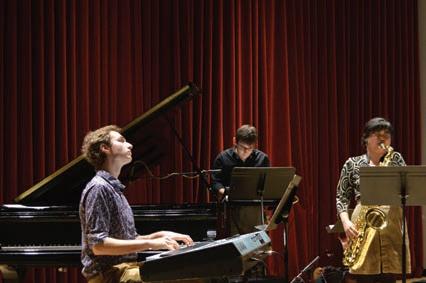
Hio Teng (Harriet) Wong Miaojun Xu
Catch a Rising Star Scholarship Eugene Chin Julian Tsang Beau Wood Yongyun Zhang Randy Zhang
Edna Chittick Scholarship
Andrew Koch
Timothy Little Katrina Turman Tiffany Walker
Roy M. Cummings Endowed Student Support Fund
John Hillman
Jane and David Davis Endowed Fellowship in Music
Patrick O’Donnell Eliza Rodriguez Tina Tran Chen (Jeremy) Wang Hanyan Zheng
Rudy de Tornyay Fellowship in Opera Nicholas Klein
Barbara, Walt, and David Dryfoos Endowed Music Award John Hillman
Marie Ferrell Endowment Maria Rivera Joseph Sugrue Joslyn Thomas Jo Beth Wasicek
Philip R. and Versa Foster Scholarship Wyatt Gardner Andrew Sumabat
Erick Gustafson Endowed Music Scholarship Kiwa Mizutani Jocelyn Moon Will Schlott Flannery Youngblood
Eleanor Hale and Raymond Wilson Endowed Scholarship
Eyad Alsilimy Taylor Bastian Sashi Govier John Mike Kohfeld Aidan O’Hara Mark Petty Kaylee Pigott Zach Schafer Matt Wild Brianna Zhou
Barbara and Lynn Himmelman Endowed Scholarship Mara Bush
Kennan and Phyllis Hollingsworth Endowed Fellowship Nicholas Tagab
Consuelo Houts Scholarship
Sylvia Jones John Neumann
L. Mildred Hurd Scholarship Fund Ariona Thompson
Demar and Greta Irvine E ndowed Scholarship Claire Anderson Ryan Carraher Elisabeth Crabtree Taina Lorenz-Turner Lu Yin
Roberta Jensen Endowed Scholarship in Music Calib Byers Maxwell Shaffer Hayden Sovereign
Clara Lee Johnson Memorial Scholarship Jakob Fortiner Elias Hampton John Hillman Mason Lynass Vivianna Oh Jack Price Lucas Victor
M. Kathleen Johnson Endowed Music Scholarship Cicy Li Zachary Matthews Sam Rockwood Nebee Yohannes
Gerald and Betty Kechley Endowed Scholarship Ryan Carraher
Jeanette Killian Scholarship Marcus Evans
Louis G. Marsh Endowed Music Scholarship Aaron Michael Butler Ryan Carraher Jee En (Alice) Liu Ben Luedcke Jingjing Qi Gabriel Velasco
Robin L. McCabe Endowment in Piano Performance Britanee Hwee Nicholas Tagab
Michael and Rebecca McGoodwin Endowed Scholarship in Music Performance
Sylvia Jones David Norgaard
Metzler-de Llaguno Endowed Award Britanee Hwee
Mu Phi Epsilon Seattle Alumni Endowed Scholarship Fund Lucy Bloomer
Nygren Family Endowed Fund in Opera Ryan Bede
Harvard Palmer Endowed Scholarship Richard Carrick Dolores Plath Music Trust Fund Christine Chu Masan Fagan Esther Kwon Jeremy Lin Eric Vasquez
Gina Funes Radke and Fred Radke Endowed Scholarship Alexander Connelly Wyatt Gardner Sylvia Jones Brianna Noble Hanna Suggs Emily Vaughan r
Helen A. Reynolds Endowed Scholarship in Music Athena Beebe Jonathan Dou Sarah Fantappiè Jackson Flesher Austin French Minsun Kim Xiaohui Ma Miriel McFarland Ye Zheng
Bernice Mossafer Rind Endowed Fund in Music Angelina Kong
Milnora de Beelen Roberts Memorial Rose Hiemstra Grace Jun Kiwa Mizutani Sadi Quinsaat Sophia Schmidt Grace Weppler
Pauline and Paul Soder Memorial Scholarship Alessandra Barrett Sophia Hansen
Vilem Sokol Endowed Scholarship Edmond Hsu Kevin Leiferman Madeline Warner
Alice J. Sorensen Memorial Scholarship Cameron Armstrong Kaity Igari
Ruth Sutton Waters Endowed Scholarship Yiyi Chen D’Laney Jevas Minsun Kim Flannery Youngblood
Marion O. Williams Endowed Scholarship Meaghan Guterman Joseph Muriello
Hans Wolf Fellows Award for Graduating Seniors Kathryn Leland Jared White
Wendy Elizabeth Adams Music Scholarship Adam Harris Megan Hutchison
Montserrat Alavedra Endowment Memorial Katherine Connors Sylvia Jones Natalia Valvano
James L. Beech Scholarship Fund Clayton Dahm
James and Harriette Bleitz Endowed Scholarship Ryan Baker Luiggi Chancafe Ava Lim Zach Matthews Neal Muppidi Chloe Person Samuel Rockwood
Boeing Endowment for Excellence
Michael Bennett
Neil M. and Kathleen Bogue Endowed Scholarship
Sylvia Jones Lawrence McDonnell Jessica Turner Natalia Valvano Emily Vaughan
Brechemin Family Endowed Scholarship Kiwa Mizutani Samuel Rockwood
Roberta Brockman Endowed Music Scholarship Ryan Baker
Ava Behinaein Edward Brannan Calib Byers Luiggi Chancafe Matthew Chao
Edna Chittick Scholarship Zach Matthews Neal Muppidi Alisa Nikishina Chloe Person
Joan Catoni Conlon Endowed Fellowship in Choral Studies
Ryan Bede Timothy Little Mark Anthony Petty Katrina Turman Tiffany Walker Leah Wyman
Roy M. Cummings Endowed Student Support Fund John (Jack) Hillman
Katyrose Jordan Ava Lim
Jane and David Davis Endowed Fellowship in Music
Claire Anderson Cameron Armstrong Michael Bennett Jackson Flesher Marquis Griffith John (Mike) Kohfeld Jocelyn Mory Maria Rivera Chen Wang Jo Wasicek Daren Weissfisch
Rudy de Tornyay Fellowship in Opera
Virginia Elizondo Jackson Flesher Kenneth Foster Yun Hye Kim Nick Klein Joseph B Muriello Tina Tran
Deborah and Meade Emory Music Award Fund Constance Aguocha Christine Chu Sarah Santos Emily Silks Rylan Virnig
Endowed Graduate Fellowship in Ethnomusicology
Claire Anderson Jackson Flesher Jocelyn Mory Maria Price Emily Silks
Marie Ferrel Endowment Eugene Chin
Philip R. and Versa Foster Scholarship Sophia Schmidt
Signe and Charles Gulliksen Memorial Fund Elena Allen
Erick Gustafson Endowed Music Scholarship
Marshell Lombard Shayla Nelson Sarah Santos Emily Silks Rylan Virnig
Barbara and Lynn Himmelman Endowed Scholarship Marcus Evans Rose Hiemstra Sylvia Jones
Kennan and Phyllis Hollingsworth Endowed Fellowship
Aaron Michael Butler Scott Farkas Yongyun Zhang
L. Mildred Hurd Scholarship Fund Mavis Chan Ariona Thompson
Demar and Greta Irvine Endowed Scholarship Clayton Dahm Douglas Fullington Joseph Krycia
Roberta Jensen Endowed Scholarship in Music Athena Beebe Katrina Turman Leah Wyman
Clara Lee Johnson Memorial Scholarship Fund
Austin French Virginia Elizondo Kenneth Foster
Scott Lakin Jones Endowed Fund Jonathan Pfeffer
Milton Katims Viola Scholarship Constance Aguocha
Beecher Keifer Memorial Music Scholarship Edward Brannan
Louis G. and Patricia A. Marsh Endowed Fellowship in Music Cameron Armstrong Ryan Bede Tyler Kimmel Nick Klein Maria Rivera Eliza Rodriguez Joseph Sugrue Jo Wasicek
Marsh Scholarship in Music Megan Francisco Robin L. McCabe Endowment in Piano Performance Dhayoung Yoon
Michael and Rebecca McGoodwin Endowed Scholarship in Music Performance Ariona Thompson Randy Zhang Renee Zhang
Metzler-de Llaguno Endowed Award Hye Yeon Kim
Bruce F. Miller Term Scholarship in Performance
Greg Smith John (Jack) Hillman Katyrose Jordan Jai Lasker
Michiko Morita Miyamoto Professorship in Piano Ava Behinaein Ian Huh D’Laney Jevas Minsun Kim Yunxi (Cicy) Li Ruochen Liao David Lin Jee En (Alice) Liu Nicholas Tagab Hanyan Zheng
Catherine Moore Fowler Endowed Scholarship
Elena Allen C Dalma Ashby Chrstine Chu Savannah Helming
Mu Phi Epsilon Seattle Alumni Endowed Scholarship Fund Galin Hebert Sylvia Jones Ellen Kwon
Harvard Palmer Endowed Scholarship Athena Beebe Tyler Kimmel Madison Lombardo
Adelyn Peck Leverett Endowed Fund Douglas Fullington
Gina Funes Radke and Fred Radke Endowed Scholarship in Music Mavis Chan Andrew Sumabat Beau Wood
Frances Redner Memorial Endowed Fund in Music C Dalma Ashby Matthew Chao Ethan Nowack Jessica Turner Emily Vaughan
Helen A. Reynolds Endowed Scholarship in Music
Cameron Armstrong Athena Beebe Matthew Chao Katherine Connors Darcy Copeland Galin Hebert Murphy Janssen Sylvia Jones Tyler Kimmel Nick Klein Ellen Kwon Timothy Little Lawrence McDonnell Ethan Nowack
Maria Price Jessica Turner Natalia Valvano Emily Vaughan Ethan Walker
Renee C. Ries and Richard T. Black Endowed Scholarship in Music Jai Lasker Ava Lim David Lin
Pauline and Paul Soder Memorial Scholarship Elena Allen C Dalma Ashby Eugene Chin Christine Chu Savannah Helming Michael King
Vilem Sokol Endowed Scholarship Rose Hiemstra Alisha Luo Anika Meisel Alisa Nikishina
Alice J. Sorensen Memorial Scholarship Jonathan (Jack) Pfeffer
John Tripp Endowed Fund for Student Support Jenny Cooper Austin French
Paul D. Tufts Endowed Fellowship Fund Darcy Copeland
Walter C. Welke Memorial Scholarship
Aaron Michael Butler Gabriel Velasco
Ruth Sutton Waters Endowed Scholarship Jenny Cooper Rylan Fischer Jakob Fortiner Kincaid Gould Zach Griffin Galin Hebert Kelly Hou Grace Jun Angie Kong Ellen Kwon
Marion O. Williams Endowed Scholarship Eric Jeffords Kathryn Leland Madison Lombardo Joseph B Muriello Tina Tran
Hans Wolf Fellows Award for Graduating Seniors Eric Jeffords Sylvia Jones Kathryn Leland Jared White
Bruce Miller, a retired long-time University of Washington staffer, was introduced to classical and symphonic music early. He began taking piano lessons when he was young but never felt he was talented as a musical performer and decided to discontinue his lessons.
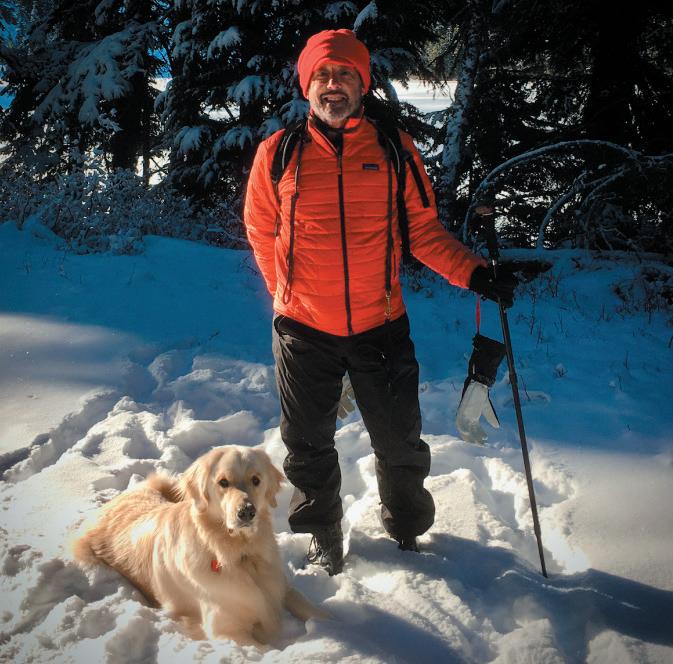
“I was exposed to classical, orchestral music as a child and fell in love,” Miller says. “I am not ‘musical,’ but I took piano lessons when I was young but I never experienced the joy I hoped for.” Though Miller continued on to become a trained scientist, he never lost his passion for the arts.
Shortly after retiring from work at the UW, Miller began focusing more on his passions and decided to start taking piano lessons again. Though he had been taking lessons on a Roland stage piano for many years, it was time for Miller to “graduate” to a real baby grand. The stage piano, however, was still in great condition and in need of a good home. Miller contacted the UW School of Music, which gladly accepted the instrument for use by its Jazz Studies program.
“This led to a meeting with the head of the Jazz program [Cuong Vu] and the School of music director at that time, Richard Karpen,” Miller says. “From Richard, I learned how hard it was for the School of Music to compete for the best instrumental students because of limited funding available for the arts.” This fateful meeting encouraged Miller to give funding to the School for a new term scholarship, specifically designed to provide crucial financial aid to students seeking performance degrees.
“I know that the arts can only flourish and inspire us if we nurture and support the talented people who make and express themselves through art,” Miller says. “It is my admiration for the people who bring art to the world, my sense of responsibility for helping to perpetuate the arts, and my conversation with Richard Karpen that led me to fund scholarships for School of Music students.”
continued on page 29
spring for the Improvised Music Project Festival (IMPFest). Since its inception in 2008, IMPFest has provided UW music students opportunities to continue spreading the works of local musicians within the genre of improvised music. The grant from the Raynier Foundation, which provides critical funding for guest artist fees and administrative costs, helps to advance these important opportunities for UW students and the greater community.
“ The generous and timely gift from the Raynier Foundation will enable the Jazz Studies Program to sustain its foundation and excellence for the next three years,” Vu says, while allowing the School of Music to provide opportunities for local artists and musicians to share their craft publicly, just as James Ray had intended.
continued on page 29
With the addition of the Baroque instruments generously donated by Steve and Sylvia, the students of the Baroque Ensemble a re able to perform eraspecific music while also keeping the historical integrity and accuracy of the sound.
“The recent acquisition of a baroque cello and a barque viola has been a tremendous boon for the students of the UW School of Music,” Cunningham says. “This kind of transformative gift provides the kind of experience that makes the UW School of Music such an attractive place to discover and explore new musical interests. I am so grateful to Steve and Sylvia Burges for their leadership and generosity!”
To make a gift in support of UW students, email Emma Silverstein, emvice@uw.edu, call 206.685.6997, or make a gift online at www. giving.uw.edu.
Gifts received July 1, 2020 to June 30, 2021
Gifts $100,000+
Paul Fritts
Christopher Leuba**
Glen & Alison Milliman
Roger & Jane Soder
Gifts $25,000 – $99,999
American Guild of Organists
Laurelhurst PTA
Nordstrom Inc.
The Seattle Foundation
Gifts $10,000 – $24,999
Neil & Kathleen Bogue
Carole Terry & Alan Fine
Gifts $5,000 – $9,999
Zhongxin Gong & Ying Li
Karen Koon
Sally Anne West
Gifts $1,000 – $4,999
Donald Ankney & Amy Rosenleaf
Kalman Brauner & Amy Carlson
Mel Butler
Diane Chattin
David & Joan Cottingham
Tony Leung & Cecilia Chung
Tonia Lindquist

Edmund & Laura Littlefield
Michael McGoodwin, in memory of Rebecca C. McGoodwin
Jon Nelson
A. Wayne & Marjorie Pietz
John Pomfret
Philip & Kinza Schuyler
Laurel Sercombe & Darwin Alonso
Alison Stamey & W. C. Twig Mills
Paul & Deborah Stamey
Sara Stamey
Virginia Stamey-Johnson & Dale Johnson
Robert & Joan Wallace
Gifts $500 – $999
Joanne Bourgeois
Stanton & Sally Cole
David Dahl
Warren & Verna Dogeagle
Gary Louie
Paul Mitchell
Cary & Joann Oshima
Jocelyn Phillips & Warren Bakken
Jane Preston
Richard & Karen Prince
Annie & Leroy Searle
Emma Brooks Smith
Pamela Steele
Joshua Steveson
Nicola Tollefson
Jeffrey & Deanna Tracy
Christy Watson
Gifts $250 – $499
Janet Bogue & Paula Newberg
George & Bonnie Brengelmann
William & Mary Hallauer
George Kenny
Michael & Beret Kischner
Michael Kleinschmidt & Marc Aubertin
Cindi Knutson
Steven & Katherine Messick
Bruce & Carol Meyers
Karen & Robert Mildes
Lucio Pessoa
Christopher Roberts
Alan & Shannon Spicciati
John & Lynn Williams
Gifts $100 – $249
Charles Alpers & Ingrid Peterson
Amy Beegle & Michael Hawrylycz
Arlene Bell
Gene & Elizabeth Brandzel
Douglas Burton
Robert Carroll
Laura Chang
Gordon & Joyce Cherry
Mark & Gretchen Coker
Thomas Crews, Jr.
Peter Davenport
Dale & Penny DeGraff
Pierre Divenyi
Jason Dougherty
Bill Dubay
John Gibbs & Janet Ness
Karen Gottlieb
Shan Han Ryan Hare
Gordon Henderson
Arlen Horst & Katherine Macdonald
Barbara Howell
Steven & Kyra Humphrey
Jari Ingerttilä
Marli Iverson
Koh-Lee Foundation
Michael & JoAnn Matlick
Robin McCabe
Terrance McCarthy
Stafford & Louise Miller
Mirabella Residents Association
Linda Moorhouse
Scott Oswald
Katherine Robbs
Kenneth Rudolf
Peter & Gail Schmunk
Blagoje & Linda Stankovic
Jan Stark
David Streatfield
This is Beethoven
Richard & Sandra Tietjen
Judy Tsou & David Carlson
Dianne Vars
Willard Wadt & Ann McLaughlin
Ryan Whitney
Giselle Wyers & Jeff Rice
Stanley & April Yantis
John Yearsley
Gifts Under $99
Marnie Arlen
Penelope Armstrong
Soo Bang
Brenda Banks
Lisa Beal-Austin
Dennis & Betty Behrens
Susan Sykes Berry
Adam Boyd
Tara Causland
Chipotle Mexican Grill
Shivang Dave
Joanne DePue
Dwyla Donohue
Tom & Virginia Dziekonski
Ann Eggers
Liz Exell
Amy Finnigan
Alan Gibbs
Harvey & Mary Jewell
Ronald Mar
Mark Montemayor
Christine Nelson
John Paulson
David & Mina Payson
Anthony & Joan Princing
Cynthia Ramirez
Sandra Ruconich
Pamela Ryker
Atsuko Savorgino
Don Sayre
Jeanne Schmitt
Mary Schneider
Vivian Siao & John Long Tyan
Maria van Tyen
Nancy Watson
Christopher & Erica Welch
Mark & Courtney Wilkerson
Cathleen Wright
We are grateful to our donors, alumni, and friends, whose generous and thoughtful support creates wonderful opportunities for our music students, faculty, and programs.

We regret any inadvertent errors; omissions will be included in the next issue of Whole Notes.
Friends of the School of Music receive invitations to special concert events in addition to recognition in programs and publications. To make a gift, please visit www.uwfoundation.org or call 1.877.894.4387. Thank you!
received July 1, 2019 to June 30, 2020
Friends of Music (Total Lifetime Giving of $10,000+)
Anonymous (4) American Brahms Society Ms. Peggy Anderson Dr. Donald Ankney & Ms. Amy Rosenleaf
Apex Foundation
The Babb Foundation Bank of America Corporation
The Barbro Osher Pro Suecia Foundation Bernard Osher Foundation
The Bishop Foundation Mr. Richard & Mrs. Linda Black Ms. Sarah Blum
The Boeing Company
Mr. Neil & Mrs. Kathleen Bogue
The Brechemin Family Foundation Ms. Mary Brockman Dr. Carol Campbell
Mr. Gary Larson & Ms. Toni Carmichael Dr. Stephen & Mrs. Sarah Carter
Mr. David Chan & Mr. Richard Oldenburg Community Church of Seattle
Dr. Joan & Professor Frank Conlon Dr. David Davis
The Defiant Requiem Foundation Mr. John Delo
Mrs. Barbara & Mr. Walt Dryfoos Mrs. Jeanne Dryfoos Mr. Richard & Ms. Min-Chih Earl Earshot Jazz Mr. H. Brad Edwards
The Endurance Fund
Fairchild Record Search, Ltd. Ms. Ellen Ferguson Ms. Ruth Freeman Ms. Miriam Friedman
Professor Emeritus Ramesh & Mrs. Shanta Gangolli
Mr. Bill & Mrs. Melinda Gates
Ms. Ruth Gerberding
Dr. George Ghosn & Ms. Karolyn Siltman Dr. Zhongxin Gong & Professor Ying Li Gordon Stuart Peek Foundation
GRAMMY Foundation
Greater Everett Community Foundation
Dr. John & Ms. Myra Hanford III
Mr. Gregg & Ms. Sandra Herrell Ms. Mary Hirsch Dr. Kennan Hollingsworth
Mr. Michael Huber & Ms. Danielle Lavilla Ms. Heechun & Mr. Charles Huh Mr. Thomas & Mrs. Julie Hull Mr. Gordon Hull
Mr. Howard Hull Mrs. Bernita Jackson Mr. Daniel Jensen Jewish Federation of Greater Seattle Mr. George & Mrs. Ellen Kauffman Professor Gerald Kechley Mr. Douglas King Ms. Karen Koon Koon Family Trust
Koon-Boen, Inc. Mr. David & Mrs. Judith Kriewall Drs. Bruce Kulander & Glenna Burmer Laurelhurst PTA Ms. Sue Letsinger Ms. Jody Li Ms. Tonia Lindquist Littlefield Farm Mr. Edmund & Mrs. Laura Littlefield, Jr. Ms. Mary Kay Long & Mr. James Wade Mr. Daniel Marble Mr. Joseph Marioni Mr. Barry McCord
Michael C. McGoodwin, in memory of Rebecca C. McGoodwin Dr. Dean & Ms. Tomilynn McManus Microsoft Corporation Ms. Aileen Miholovich** Dr. Donald & Mrs. Linda Miller, Jr. Mr. Bruce Miller & Ms. Sandra Kroupa Mu Phi Epsilon
National Philanthropic Trust – UK Ms. Marilyn Newland Ms. Cathy Palmer Ms. Anne Arnold Parry Peach Foundation Mrs. Gloria Peck Dr. Joe Pennario Mr. Phillip & Ms. Katie Person Mr. A. Wayne & Mrs. Marjorie Pietz Ragamala
Raynier Institute & Foundation Ms. Renee Ries
Sacred Music Chorale Sage Foundation Dr. Hiromi & Mr. Sumio Sakata
Professor Timothy & Ms. Jodi Salzman
Dr. Mansour Samadpour & Ms. Dalia Alfi
Mr. Steve & Mrs. Laurel Samuelson
Dr. Philip & Ms. Kinza Schuyler
Annie & Leroy Searle
The Seattle Foundation
Drs. Laurel Sercombe & Darwin Alonso
Mr. Dean Scotton**
Jane & Roger Soder
Dr. Gloria & Mr. Donald Swisher
Professor Emerita Diane Thome
Ms. Diana & Mr. Richard Thompson
The Tulalip Tribes
United Way of King County
Professor Joseph Vance & Ms. Sara Throckmorton
Ms. Joan Watjen
Ms. Sally West
Mr. William & Ms. Gayle Wilson
Ms. Penelope Yonge
Dr. George Youngstrom**
Mr. James & Ms. Joan Yragui
Gifts $100,000+
Anonymous (2)
Apex Foundation
Ms. Aileen Miholovich**
Raynier Institute & Foundation Mr. Dean Scotton**
Gifts $25,000-$99,999
Sacred Music Chorale
The Seattle Foundation
Ms. Valerie Sils
Ms. Diana & Richard Thompson
Gifts $10,000-$24,999
Mr. Neil & Mrs. Kathleen Bogue
Mr. Timothy Copes & Ms. Amy Lee
Mr. Bruce Miller & Ms. Sandra Kroupa
Gifts $5,000-$9,999
American Orff-Schuelwerk Association
Prof. Stephen & Mrs. Sylvia Burges
Dr. Zhongxin Gong & Prof. Ying Li
Ms. Fances Walton
Ms. Sally Anne West
Gifts $1,000-$4,999
Dr. Donald Ankney & Ms. Amy Rosenleaf
Mr. Kalman Brauner & Ms. Amy Carlson
Dr. Stephen & Ms. Sarah Carter
Ms. Ann Davis
Mr. Richard & Ms. Min-Chih Earl
Ms. Patricia Fowler
Mr. Stephen Frederick
Dr. David & Ms. Suzanne Greeley
Mr. Tung-Shing Leung & Ms. Cecilia Chung
Ms. Tonia Lindquist
Dr. Michael McGoodwin in Memory of Rebecca McGoodwin
Dr. Jon Nelson
Mr. A. Wayne & Mrs. Marjorie Lee Pietz
Ms. Heidi Renz
Dr. Philip & Ms. Kinza Schuyler
The Seattle Foundation
Dr. Laurel Sercombe & Dr. Darwin Alonso
Gifts $500-$999
Dr. Raymond Bannon
The Brechemin Family Foundation
Dr. George Brengelmann
Ms. Karen Tollenaar Demorest
Horizon House
Ms. Kaitlynn A. Igari
Mrs. Bernita Jackson
Dr. Jean-Marie Kent
Dr. Corina & Mr. Greg Linden
Mr. Gary Louie
Dr. Richard & Ms. Karen Prince
Annie & Leroy Searle
Dr. Pamela & Mr. Patrick** Steele
Gifts $250-$499
Somchai Asawadilokchai
Ms. Janet Bogue & Ms. Paula Newberg
Ms. Kelsey Croft
Dr. David Fluharty & Ms. Lisa Bergman
Mr. Perry Huang
Dr. Michael & Ms. Beret Kischner
Dr James** and Mrs. Maria Koh
Mr. Izzy Majcher
Dr. William & Prof. Mary Hallauer
Mr. Steven & Katherine Messick
Mr. Bruce & Ms. Carol Meyers
Dr. Karen & Mr. Robert Mildes
Mr. Frank & Ms. Mary Montgomery
Mr. Cary & Ms. Joann Oshima
Mr. Christopher Roberts
Drs. Cornelius & Penny Rosse
Mr. Murl Sanders & Ms. Janet Hesslein
Dr. Glenn Silva
Dr. Emma Brooks Smith
Mr. Alan & Ms. Shannon Spicciati
Ms. Meghan Stavig
Ms. Nicola Tollefson
Janna Warburg
Ms. Christy Watson Dr. John & Ms. Lynn Williams Dr. Antoinette Wills
Gifts $100-$249
Dr. Charles Alpers & Dr. Ingrid Peterson
Mr. Richard & Ms. Susan Alvord
Anonymous
Ms. Judith Arboleda
Mr. Darce Barager
Ms. Arlene Bell Dr. Joanne Bourgeois
Mr. Gene & Ms. Elizabeth Brandzel
Mr. Douglas Burton
Prof. Patricia & Prof. Charles Campbell
Prof. Philip & Ms. Mary Carlsen
Dr. Robert Carroll
Ms. Laura Jun-Ling Chang Chien-Her Chin
Dr. Robert & Ms. Mary Cleland
Dr. Thomas Crews
Mr. Peter Davenport Dr. Pierre Divenyi Ms. Jason Dougherty
Ms. Annette Gordon Ms. Shan Han Dr. Ryan Hare Barbara Howell
Mr. Robert & Ms. Bonnie Iseminger Mr. Charles Keagle
Dr. Kyungha & Hyojin Kim Ms. Marilyn Lippincott
Dr. William Mahrt
Mr. Michael & Ms. JoAnn Matlick
Prof. Robin McCabe
Ms. Ann McLaughlin & Mr. Willard Wadt
Dr. Stafford & Ms. Louise Miller
Ms. Janet Ness & Mr. John Gibbs
Mr. Daniel & Ms. Karen Oie
Julie C. Van Pelt
Lucio Pessoa
Dr. Kenneth Rudolf
Mr. Winston Saunders & Ms. Sara Stamey
Mr. Peter & Ms. Gail Schmunk
Mr. Blagoje & Ms. Linda Stankovic
Prof. David Streatfield
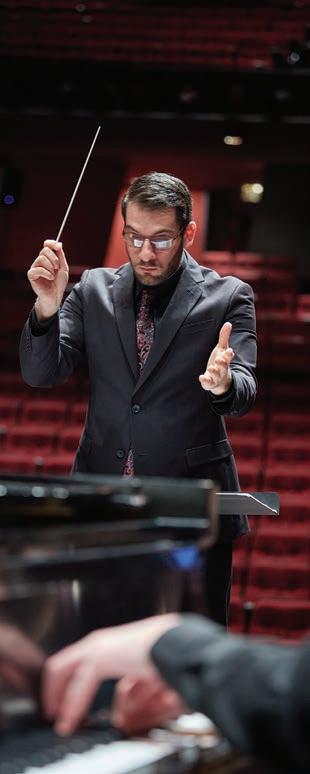
Ms Judy Tsou & Mr. David Carlson
Ms. Margaret Van Gasken
Ms. Anne-Marie Van Wart & Mr. Lee Winkler
Mr. Phillips Foss Wood & Judy Mahoney Dr. John & Ms. Karen Yearsley
Gifts under $99
Anonymous (4) Ms. Marnie Arlen Ms. Soo Bang
Susan Sykes Berry
Mr. Robert Brown
Mr. Kevin & Ms. Deborah Brown Ms. Susan Cady
Mr. Doug & Ms. Constance Clark Ms. Dwyla Donohue Mr. Bill Dubay Mr. Tom & Ms. Virginia Dziekonski Dr. Kaley Easton Ms. Pamela Elderkin
Ms. Ann Emory
Mr. John & Mrs. Phyllis Ernsberger Ms. Amy Finnigan
Mr. Leonard & Ms. Linda Good Ms. Nancy Hautala
Dr. Whitney Henderson Ms. Judith Herrigel
Dr. E. Harvey & Mrs. Mary Jewell Ms. Eileen Koven
Mr. Christopher Lennard Lindsey Maliekel
Mr. Ronald Mar Dr. Mark Montemayor
Ms. Marilyn Newland
Mr. David & Ms. Mina Payson Prof. James Pridgeon & Ms. Carol Fahrenbruch
The Red Door Music Studio
Ms. Katherine Robbs
Ms. Lauren Rustad Roth Dr. Sandra Ruconich
Mr. Frederick & Ms. Lynn Rupp
Ms. Pamela Ryker
Ms. Atsuko Savorgino
Ms. Jeanne Schmitt
Ms. Mary Schneider
Mr. Larry Shibler
Dr. Vivian Siao & Mr. John Long Tyan
Dr. John & Ms. Constance Sidles Mr. GregRobin Smith
Ms. Valerie Taylor
Ms. Paulette Thompson
Mr. Joseph & Ms. Marsha Urlacher
Ms. Maria Van Tyen Dr. Dianne Vars
Mr. William** & Ms. Nancy Watson
Mr. Christopher & Ms. Erica Welch Mr. Ryan Whitney Mrs. Cathleen Wright ** Deceased
Box 353450 Seattle, WA 98195-3450
Nonprofit Organization U.S. Postage PAID Seattle, WA Permit No. 62
facebook com/UWMusic instagram com/uw_music youtube com/udubmusic music.washington.edu
 Photo: Steve Korn
Photo: Steve Korn